
Toefl Preparation Online Courses, Free Questions & Sample Answers

Mastering TOEFL Writing: A Comprehensive Guide for Success
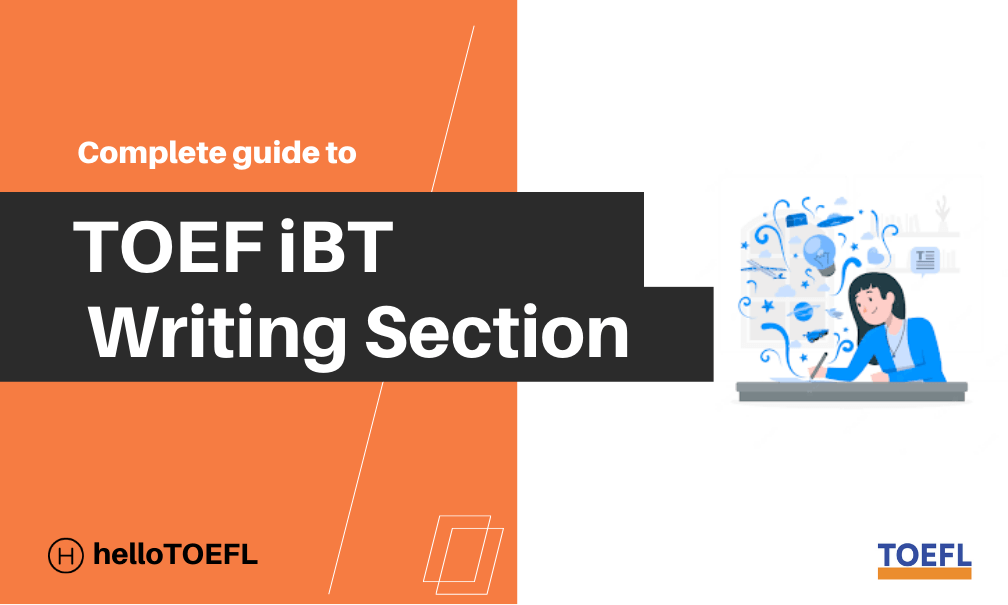
- TOEFL Writing Guide 2023
Welcome to the “TOEFL Writing Guide,” your ultimate resource for mastering the Writing section of the TOEFL iBT test! Whether you’re a beginner or aiming to refine your skills, this comprehensive guide offers essential strategies, tips, and high-scoring essay samples. Let’s embark on this writing adventure together and achieve excellence in the TOEFL exam!
Table of contents
Integrated writing task:, independent writing task:, developing strong arguments:, enhancing language proficiency:, time management and practice:, actual practice:, sample essay prompts and model answers:, conclusion:, looking for help in other sections, understanding the format of the toefl writing section.
Before diving into the specifics of each task, let’s understand the format and structure of the TOEFL Writing section. This section assesses your ability to write in English in an academic environment and consists of two distinct tasks: Integrated Writing and Independent Writing.
Table: Overview of TOEFL Writing Section Tasks, Time Allotment, and Scoring Criteria
| Task | Description | Time Allotment | Scoring |
|---|---|---|---|
| Integrated Writing | Summarize a passage and lecture on an academic topic. | Approximately 20 minutes | Effectiveness of combining information from both sources |
| Independent Writing | Provide a response to a question or statement on a general topic. | Approximately 30 minutes | Clarity of expression, coherence of ideas, and quality of writing |
Key Points:
- The total time for both tasks is 50 minutes.
- You can type your responses on a computer for the TOEFL iBT or handwrite them for the TOEFL iBT Paper Edition.
- Scoring is based on the Writing Scoring Guides (Rubrics), considering aspects like coherence, development, organization, and language use.
The Integrated Writing task combines reading, listening, and writing skills. You will read a passage on an academic topic and listen to a related lecture. Your task is to summarize the key points from both sources and demonstrate your ability to effectively combine the information.
In the Integrated Writing task, you will need to:
- Read a Passage: The reading passage typically presents a viewpoint on an academic topic or concept. It may contain arguments, examples, and evidence to support the main idea.
- Listen to a Lecture: The lecture complements the information provided in the reading passage. It may present contrasting or supporting viewpoints, additional examples, or explanations.
- Summarize and Combine Information: After reading the passage and listening to the lecture, you must combine the essential points from both sources. Your summary should highlight the main ideas and key arguments presented in both the reading and the lecture.
- Write Your Response: Your response should be a well-structured essay that includes an introduction, body paragraphs, and a conclusion. Your ability to effectively summarize and synthesize information from the reading and the lecture will be crucial for a high score.
Example Question: Summarize the main points from the reading passage and the lecture. Explain how the lecture challenges the ideas presented in the reading passage.
Model Answer: The reading passage discusses the benefits of renewable energy, emphasizing its positive impact on the environment and long-term sustainability. The lecture further supports these benefits by providing specific examples of successful solar energy projects. However, the lecture also challenges the reading by raising concerns about the initial costs of implementing renewable energy solutions. In conclusion, both the reading and the lecture underscore the significance of embracing renewable energy to address climate change.
The Independent Writing task requires you to express your opinion on a general topic. You will receive a question or statement and must provide a well-structured and coherent response based on your knowledge and experience.
In the Independent Writing task, you will need to:
- Understand the Prompt: The prompt may ask for your opinion on a specific issue, your preference between two options, or your response to a statement. Make sure to grasp the central idea and requirements of the prompt.
- Develop a Clear Thesis Statement: Your thesis statement should clearly state your position or opinion on the topic. It will serve as the main argument that you will support throughout your essay.
- Organize Your Ideas: Structure your essay with a clear introduction, body paragraphs, and a conclusion. Each body paragraph should present a separate supporting point, with relevant examples and evidence.
- Support Your Arguments: Use specific examples, personal experiences, or evidence from your knowledge to support your points. The more specific and detailed your examples, the stronger your arguments will be.
- Write Coherently: Ensure that your essay flows smoothly from one idea to another. Use appropriate transitions between paragraphs and sentences to maintain the overall coherence of your writing.
Example Question: Do you agree or disagree with the statement, “Technology has had a positive impact on modern communication”? Use specific reasons and examples to support your answer.
Model Answer: I agree that technology has had a positive impact on modern communication. Technological advancements, such as the internet and smartphones, have revolutionized the way people communicate globally. Instant messaging and social media platforms allow individuals to connect with others across borders, bridging cultural differences and promoting global understanding. However, it is crucial to balance technology usage to avoid overreliance and potential negative effects on face-to-face communication.
Effective Essay Organization:
A well-organized essay is the backbone of a high-scoring TOEFL Writing response. To begin, your essay should have a clear introduction that introduces the topic and presents a strong thesis statement. Each body paragraph must have a topic sentence that supports the thesis, followed by relevant supporting details and examples. Utilizing proper transitions between paragraphs ensures a logical flow of ideas and enhances the overall coherence of your essay.
In the Integrated Writing task, your ability to extract essential points from the reading and listening passages is crucial for constructing a well-rounded response. In the Independent Writing task, focus on forming compelling arguments and support them with relevant examples and reasoning. Striking the right balance between personal experiences and evidence from the provided sources strengthens your arguments and demonstrates critical thinking skills.
A rich vocabulary and grammatical accuracy are essential for effective academic writing. Learn and incorporate advanced vocabulary relevant to various topics to elevate your essay’s language and impress the evaluators. Additionally, use sentence variety to contribute to a polished writing style and avoid common errors and pitfalls.
Time management is critical during the TOEFL Writing section. Create a study plan that allocates sufficient time for practice, skill-building, and revision. Engage in timed practice sessions to simulate test conditions and improve your ability to write efficiently under pressure. Review and analyze your practice essays to pinpoint areas for improvement, allowing you to refine your skills over time.
To solidify your understanding of the concepts, take advantage of our practice questions and essay prompts specifically designed to simulate the TOEFL Writing section. Engage in mock tests to familiarize yourself with the test format and fine-tune your writing speed and accuracy.
Practice is key to mastering TOEFL Writing. Explore a collection of sample essay prompts for both Integrated and Independent Writing tasks. Analyze practice passages, lectures, and essays for the Integrated task, as well as diverse essay topics with model responses for the Independent task. These examples serve as valuable resources for practicing and honing your writing abilities.
By incorporating these writing tips and practicing consistently, you’ll be well-prepared to excel in the TOEFL Writing section. Remember, writing is a skill that can be honed with dedication and effort. Happy writing, and best of luck on your TOEFL journey!
Note: For comprehensive TOEFL Writing preparation, explore expert resources, practice questions, and writing tips available on our website. Together, we’ll help you become a confident and proficient writer for the TOEFL iBT test.
Scoring Resources
Explore the following scoring resources provided by ETS. Click on the links to view the files on ETS’s website.
- Performance Descriptors for the TOEFL iBT ® Test (PDF) Descriptions of different performance levels on the TOEFL iBT test.
- Scoring Guides (Rubrics) for TOEFL iBT Speaking Responses (PDF) Criteria to evaluate speaking responses.
- Scoring Guides (Rubrics) for TOEFL iBT Writing Responses (PDF) Rubrics for writing assessment.
These resources will help you understand the scoring system and improve your performance on the test. Happy studying!
- TOEFL Reading Guide 2023 : Boost your reading comprehension and answer various question types.
- TOEFL Listening Guide 2023 : Hone your listening abilities and practice answering audio-based questions.
- TOEFL Speaking Guide 2023 : Enhance your speaking proficiency and become familiar with different task formats.
- TOEFL Writing Guide 2023 : Enhance your writing skills and become familiar with different task formats.
Let’s embark on this journey together to achieve excellence in the TOEFL exam!

How the Essay is Evaluated
- Development: How well you have developed your ideas and arguments.
- Organization: How well your essay is organized and structured.
- Language Use: How effectively you use grammar, vocabulary, and syntax to convey your ideas.
- Mechanics: How well you use punctuation, capitalization, and spelling.
- Overall Writing Quality: How well your essay meets the expectations of a proficient writer.
Understanding the Scoring Criteria
- Task Completion: This measures how well you have addressed the prompt and completed the task.
- Language Use: This assesses your ability to use a wide range of vocabulary and grammatical structures accurately and appropriately.
- Coherence and Cohesion: This evaluates how well you have organized your essay and used transition words and phrases to connect your ideas.
- Development and Support: This measures how well you have developed your ideas and provided appropriate examples and details to support them.
How the Criteria are Evaluated
- Addresses the prompt fully and directly
- Uses a variety of sentence structures and vocabulary words
- Has a clear and well-organized structure
- Uses transition words and phrases effectively
- Provides specific examples and details to support ideas
| Scoring Category | Score Range | Characteristics of Essays |
|---|---|---|
| Task Completion | 0-5 | Addresses prompt and fully completes the task |
| Language Use | 0-5 | Uses a wide range of vocabulary and grammatical structures accurately |
| Coherence and Cohesion | 0-5 | Has a clear and well-organized structure, uses transition words effectively |
| Development and Support | 0-5 | Provides specific examples and details to support ideas |
Best Practices for Preparing for the Independent Writing Task in TOEFL
1. emphasize practice and preparation.
- Allocate enough time for practicing writing in English before the test date
- Use official practice materials from ETS or reliable sources to practice writing
- Take timed practice tests to improve your time management and get accustomed to writing under pressure
- Identify your strengths and weaknesses and work on them through targeted practice
- Get feedback on your writing from a teacher or tutor, and use it to improve your skills
2. Tips for Brainstorming and Outlining
- Read the prompt carefully and identify the key points and requirements
- Brainstorm ideas related to the prompt and write them down
- Organize your ideas into a logical and coherent structure using an outline
- Include specific details and examples to support your ideas
- Ensure that your ideas are relevant to the prompt and answer the question directly
3. Importance of Developing a Clear and Concise Thesis Statement
- A thesis statement is the main point or argument that you will be making in your essay
- Developing a clear and concise thesis statement helps you stay focused and on-topic
- Your thesis statement should be included in your introduction paragraph and should be easy to understand
- Your thesis statement should directly address the prompt and answer the question being asked
- Make sure to support your thesis statement with relevant details and examples throughout your essay
4. Other Tips for Success
- Use appropriate sentence structures, vocabulary, and grammar
- Make sure your essay has an introduction, body, and conclusion
- Proofread your essay for spelling and punctuation errors
- Stick to the time limit and manage your time wisely
- Stay confident and focused, and avoid getting sidetracked
Best Practices for Writing the TOEFL Independent Essay
Importance of organization and structure.
- Plan your essay before writing: Create an outline of your essay to help you organize your thoughts and structure your essay effectively.
- Use paragraphs to organize your ideas: Each paragraph should focus on one main idea that supports your thesis statement.
- Use transitional words and phrases: Transitional words and phrases help to connect ideas between paragraphs and make your essay flow smoothly.
- Use clear and concise language: Avoid using unnecessary words or phrases that do not contribute to the clarity of your essay.
Effective Introduction and Conclusion
- Hook your reader in the introduction: Use an interesting fact or anecdote to grab the reader’s attention and make them want to read further.
- Provide background information: Give some context to the topic you are writing about to help the reader understand the importance of the issue.
- End with a clear thesis statement: Your thesis statement should be concise and specific, outlining the main argument of your essay.
- Summarize your main points in the conclusion: Recap the main points you discussed in your essay and tie them back to your thesis statement.
- Avoid introducing new information in the conclusion: The conclusion should not introduce any new information or arguments.
Supporting Ideas with Evidence and Examples
- Use credible sources: When supporting your ideas, use reliable sources such as academic journals, books, and reputable news sources.
- Provide specific examples: Use concrete examples to illustrate your points and make your arguments more convincing.
- Explain the relevance of your evidence: Make sure to explain how your evidence supports your argument and why it is important to the overall topic.
Effective Use of Language and Grammar
- Use a variety of sentence structures: Mix up your sentence structure to make your essay more interesting and engaging to read.
- Avoid using overly complex vocabulary: While it’s important to use proper academic vocabulary, don’t try to use words that you are not comfortable with or that are overly complex.
- Proofread your essay: Take time to review your essay and correct any grammatical or spelling errors. Make sure your sentences are clear and easy to understand.
- Practice writing essays: The more you practice writing essays, the better you will become at using proper language and grammar.
Strategies for Achieving a High Score
Time management, keep pace and stay on task, proofreading and editing, revising and improving an essay, what is the highest score possible for the independent writing task, how long should my essay be for the independent writing task, is it better to write a longer essay or a shorter one for the independent writing task, are there any resources available to help me prepare for the independent writing task, what should i do if i run out of time during the independent writing task, is it possible to prepare for toefl in 10 days, key takeaways.
- Practice and preparation are crucial to achieving a high score on the TOEFL independent essay.
- Effective organization and structure are necessary to clearly express your viewpoint.
- Support your ideas with evidence and examples to make your essay more convincing.
- Use proper language and grammar to enhance clarity and coherence.
- Time management is important for completing the essay on time.
- Proofreading and editing are essential for identifying and correcting errors in your writing.
Applying Strategies and Tips

TOEFL Speaking Question 4: Sample Question #1

TOEFL Exam Preparation Ultimate Guide

Master the TOEFL Speaking Question 3

TOEFL Speaking Question Three: Sample Question #2

- English Level
- Speaking Quiz
- Listening Practice
Quick Links
- How It Works
- Private Lessons
get in touch
- Ask Us Anything
- 2023 © Copyright New York English
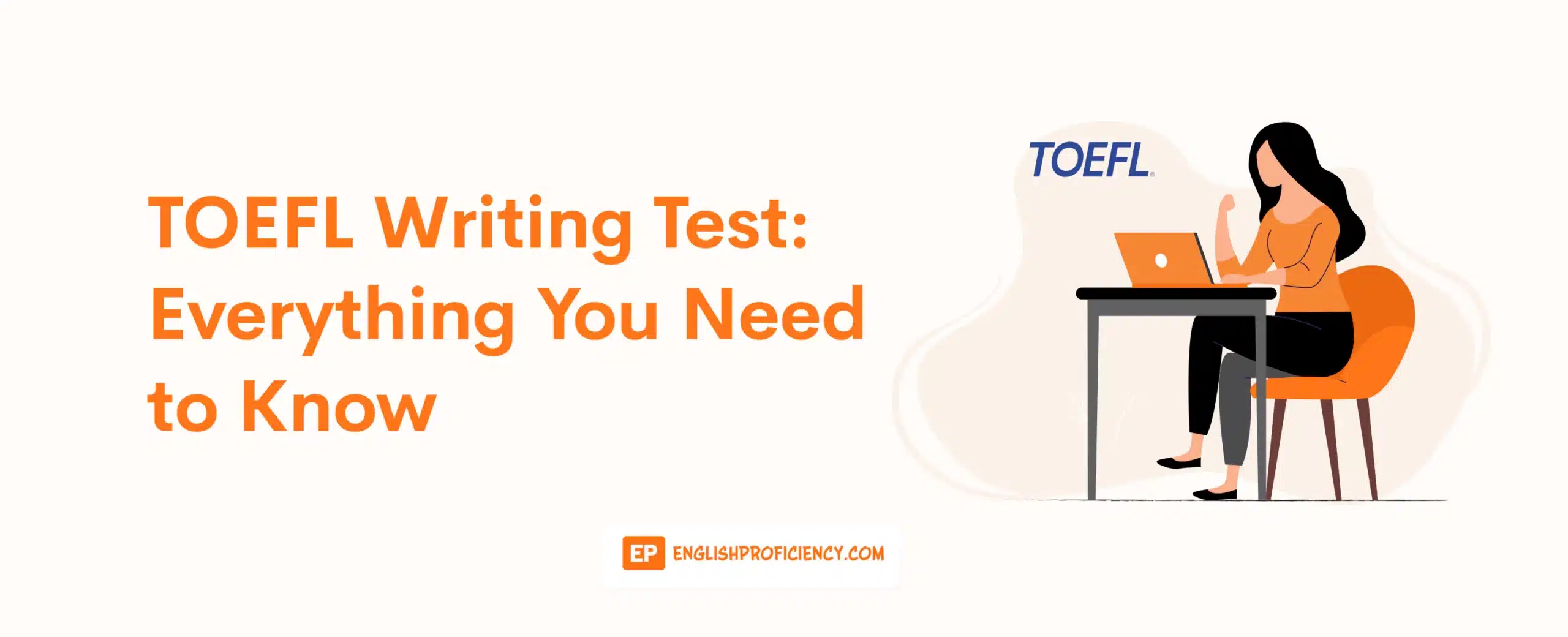
TOEFL Writing Test: Everything You Need to Know
The tasks in the TOEFL Writing section are designed to assess your English competence, so you do not have to be an expert on any particular subject to do well. The raters understand that each essay is the first draft, and you will not have the chance to correct whatever mistake it is you think you have committed. It is a must that you give it your best shot.
This article is here to guide you with everything you have to know about the TOEFL Writing section to get the score that you are aiming for eventually. Please continue reading.
What is TOEFL?
What is the toefl writing section, what are the purposes of toefl writing, toefl writing section question types, how are you graded in toefl writing section, grammar in toefl writing section: is it important, vocabulary in toefl writing section: is it important, tips and tricks to ace toefl writing section, toefl writing tips for acing the section on test day, additional faqs – toefl writing section.
Students applying to colleges and universities in English-speaking countries such as the US, the UK, Canada, Australia, or New Zealand take the TOEFL (Test of English as a Foreign Language) , a standardized academic English test.
The TOEFL is primarily a set of tests, the most well-known of which are the TOEFL iBT and TOEFL Essentials . The TOEFL ITP (Institutional Testing Program) , TOEFL Junior , and TOEFL Primary exams are part of the TOEFL series.
Other TOEFL forms are only available at students’ schools. In April 2021, the TOEFL PBT (Paper-Based Test or Paper-Delivered Test) will be phased out.
The TOEFL iBT is a three-hour test that determines whether candidates are ready to enroll in an educational institution in an English-speaking country .
Before taking the TOEFL, many students study for 3 to 6 months. In comparison to the other tests, the TOEFL Essentials exam was created to be a less academically oriented, less challenging English test.
The TOEFL consists of four parts:
- Which Countries and Universities Accept TOEFL?
- TOEFL Scores for the Top Universities in Canada
- TOEFL Scores for the Top Universities in the UK
- TOEFL Scores for the Top Universities in the USA
- TOEFL Scores for the Top Universities in New Zealand
- TOEFL Scores for the Top Universities in Australia
- TOEFL Scores for Top MBA Programs and Business Schools
The TOEFL Writing is the last section of the TOEFL . It lasts about 50 minutes and includes two tasks: integrated writing and independent writing. Your objective is to write at least 150 – 225 words.
- You will read a brief piece and listen to a brief lecture before writing a response to what you have read and heard.
- The TOEFL Independent Writing Tasks last about 30 minutes to plan and write.
- You will be asked about your viewpoint or position on a particular topic. Both essays are typed on a computer.
Your essays will be graded by numerous (usually four) raters after you finish the exam. Each essay will be graded on a scale of 0 to 5. The total of these two scores will be scaled to a score between 0 and 30, which will be your official TOEFL Writing score. The TOEFL Writing section accounts for 25% of your total score (from 0-120).
The TOEFL Writing section assesses your ability to write a well-structured essay with strong arguments, as well as your command of English syntax and vocabulary. Graders also consider development and language use as the key factors for evaluating your essays.
The TOEFL Writing aims to assess your ability to:
- Synthesize and summarize what you have read in your textbooks as well as what you have heard in and out of class.
- Form your own opinion based on the facts you have gathered.
- Demonstrate a strong primary concept and a well-structured structure with well-developed arguments backed up by solid proof.
- Show your knowledge on how to use grammar and language effectively.
- Use appropriate length, tone, and conclusion on your essay .
The TOEFL Integrated Writing and Independent Writing sections contain different types of questions. All of which require different approaches.
Here are the different question types you will encounter in the TOEFL Integrated and Independent Writing sections.
Task 1: Integrated Writing Task
The TOEFL Integrated writing essays include both reading passages and listening portions.
You read a brief text of at least 230 – 300 words on a general or academic topic before listening to a segment of a lecture on the same subject.
You are then asked to summarize what was stated in the lecture and how it assists or weakens the concept of the reading passage in an essay prompt.
Task 1 Questions can be one of the following:
Lecture vs. Passage Question
Problem passage question, three problems question.
In this TOEFL Writing question, the lecturer disagrees with the reading passage. A sample writing response provides both sides of the argument (lecture and reading passage), followed by a list of how the lecturer disagrees with the points stated in the order.
You need to determine the main theme, then explain how each point contradicts or refutes the reading text.
Example: Summarize the lecture’s points, and be sure to clarify how they cast doubt on the reading passage’s specific issues.
The paragraph in the TOEFL Writing Problem Passage question gives three solutions to a problem. The lesson, on the other hand, the lesson disproves each of the passage’s conclusions.
You have to look for the major issue and list how the lecturer disagrees with the reading passage. Then you must explain why each of the reading passage’s answers is ineffective.
Example: Summarize the points stated in the lecture and explain how they contradict specific claims/ arguments presented in the reading passage.
The reading passage specifies three difficulties in the TOEFL Writing Three Problems question. The lecture then responds and explains why these are not issues.
You need to concentrate on the points and then structure your essay. Then, throughout the lecture, connect each problem from the reading section to its solution. You have to locate the three problems, then match them with the three solutions.
Example: Summarize the arguments stated in the lecture, be sure to precisely explain how they answer the concerns raised in the reading passage.
Task 2: Independent Writing Task
Students produce an essay in response to a prompt on the TOEFL Independent Writing task, which can cover a wide range of general topics. There are no reading passages or lecture excerpts in this job; it is solely dependent on the essay question.
The highest-rated independent essays contain mostly at least 300 words long, as suggested by the requirements that come with the essay topic.
Task 2 Questions can be one of the following:
- Agree or Disagree Question
View Both Sides Question
Preference question, multiple choice question, describe or explain question, agree/disagree question.
The TOEFL Writing Agree/Disagree question is straightforward. The question requires you to choose between agreeing and disagreeing.
Using excellent examples to back up your stance is critical for a high-scoring answer in this type of question. Feel free to draw on your own personal experiences or familiar logical arguments.
Example: Do you agree with the following statement or disagree with it? Students should prioritize studying history and literature over science and mathematics. To support your perspective, give concrete explanations and instances.
This TOEFL Writing task is similar to the ‘agree/disagree’ type of essay topic, but it is a little more challenging for the reason that you have to consider two opposing viewpoints. It is also not as common, which is a good thing.
Example: Your relatives and friends are advising you to purchase a new automobile. What are some of the advantages and disadvantages of buying a brand-new car instead of a second-hand car? Use examples to explain your ideas.
The TOEFL Writing Preference question allows you to choose between two options. The subject could cover a wide range of topics. You have to pick a position and provide examples to explain why you prefer one over the other.
Example: People can now converse more easily thanks to technological advancements. Some people like to talk on the phone, while others prefer to text. Which communication method do you favor, and why?
You have a lot of choices to pick from in this type of TOEFL Writing question. To back up your answer, give concrete reasoning and instances. Choose the alternative for which you can make a compelling case.
If you have trouble deciding between two options, make a short summary of the advantages and disadvantages of each (2-3 reasons).
Make sure you can make solid decisions so you can spend more time discussing your ideas. You do not want to spend 15 minutes writing only to learn that another option would have been a better fit!
People nowadays prefer spending time away from their work and school duties. Many people take advantage of this time to go to new areas and learn more about them. What do you believe is the best approach to learn about a location you’ve never been to before?
- Visiting a museum
- Taking a tour of popular places with a guide
- Visiting a well-known shopping district
- Having a conversation with a local
- Watching a local TV channel To back up your answer, give concrete explanations and instances.
This is, in some ways, the most challenging form of the TOEFL Independent essay question because it does not provide you with an A or B option.
Instead, you must choose your own topic from a large pool of choices.
Example: What, in your point of view, is the most vital quality that a person can possess in order to be successful in life? Explain your answer with concrete explanations and examples from your own experience.
Having the knowledge of how the TOEFL Writing is scored is a must. This way, you will be aware of the things that you need to focus more on while preparing for the TOEFL .
TOEFL Integrated Writing Task — Scoring or Grading
A score of 5 on the TOEFL Writing Integrated essay shows that the student properly inferred the most significant material from the reading and listening passages and presented their understanding in a well-organized and grammatically sound manner.
TOEFL Independent Writing Task — Scoring or Grading
A 5 on the TOEFL Writing Independent Writing task indicates that the essay effectively addresses the prompt’s issue with a well-structured essay that makes extensive use of standard written English.
Lower-scoring test takers have failed to meet some or all of these objectives.
The only component of the TOEFL where your grammatical knowledge is directly measured in these two essays. It is the area where poor grammar has the greatest impact on the quality of your essay and total score.
When it comes to TOEFL grammar , the most important thing is correct. You may utilize sophisticated verb tenses and phrases if you are certain that you are utilizing them correctly. It is preferable to employ proper simple grammar rather than wrong sophisticated grammar.
Because arguments and examples can be laid out in Simple Past or Simple Present , there is no need to employ sophisticated language in your essays. You can also utilize gerunds and simple conditional forms, but keep it simple not just in your thesis but also in your grammar. If you are unsure, play it safe and simplify.
Here are some important grammar features to keep in mind and rely on when writing your essays:
- Verb Tenses
You must master these concepts. Know the proper verb endings, review the irregular verb forms, and practice identifying little but critical errors like “People says” (“people” is plural, thus it should be “people say”).
Understand the difference between present and past perfect: Is “I have been doing” or “ I had been doing” correct? Both are correct forms of present perfect and past perfect, but depending on the context, you need to use one over the other. Make it a point that you know how to achieve it.
- Conditionals and Gerund Tenses
These will add depth to your essay by demonstrating to the assessor that you can utilize more complex sentences and express yourself in a number of ways.
- Usage of Passive Voice
This will aid in the presentation of your argument. For example, “British scientists have discovered” sounds stronger and more authoritative than “It has been discovered”.
The most crucial component of preparing to write successful TOEFL essays is developing a broad vocabulary with a wide range of words and phrases to describe your ideas and views. The more vocabulary you have, the better! You will have more ways to express your ideas if you have a larger vocabulary.
When it comes to grammar forms, playing it safe is a good technique, but not when it comes to vocabulary. Even if your grammar and structure are strong, relying on generic, basic language will result in a flat, dull essay that will not obtain the highest mark of 5 points.
Studying synonyms is one of the simplest methods to expand your vocabulary. To learn synonyms, compile a list of your most often used words and learn a handful of their synonyms using online dictionaries and other resources. In no time, you will notice progress in your writing.
Another key aspect of vocabulary development is detecting terms that you may be using wrongly. These could be similar-sounding verbs or adjectives.
- whet and wet
- master and muster
- complement and compliment
- gregarious and egregious
- Ultimate TOEFL Vocabulary List
- Essential Words for the TOEFL Test
To improve your knowledge and skills for the TOEFL Writing Test, you must use a variety of tactics and techniques that will help you prepare for this section of the exam. Here are a few of them:
- Understand the TOEFL Writing test format.
You will be required to prove your ability to write in English in the TOEFL Writing part. To ace this part, you must first understand the test format before studying and utilizing various TOEFL tips and tactics.
The TOEFL Writing test is divided into two tasks: the TOEFL Integrated and TOEFL Independent Writing tasks , both of which require different approaches.
- Learn how to paraphrase effectively.
The TOEFL Writing Integrated Writing task requires you to summarize someone else’s ideas without using the same terms.
Learning to extract the most significant concepts and rephrasing them in your own words is a vital skill for this assignment.
- Study the two forms of essays.
The format for the TOEFL Writing portion is always the same: first, the integrated writing job, then the independent writing task. It is critical to prepare for both aspects equally.
You will always be asked to summarize and highlight content from a text and a recording in Task 1 of the TOEFL Writing portion. Take the time to practice these skills by using any English-language materials available.
Although Task 2 is more general, you can prepare vocabulary and writing structures to reply to the primary question types described above.
- Practice putting together a written summary of what you have heard and read.
Before listening to a discussion on the same topic, read a text. Make a list of how the material offered is similar and different. Read a topic-related editorial.
Then talk to someone about it and pay attention to what they have to say about it. Then create a summary of the various points of view.
- Make use of reading materials that include follow-up questions.
Look for college textbooks, language books, or online reading resources with follow-up questions after each tale or chapter to learn how to construct sentences, brief paragraphs, and short answers.
You can always ask a teacher or a friend to write you some questions if your favorite book does not include any.
- Make use of practice papers.
One of the finest strategies to prepare is to make sure that the TOEFL Writing test is not your first time taking it.
Utilize the materials available online to practice answering questions about writing. If you do not have time to complete a full practice paper every time, organize your responses to the activities to get into the habit of tackling TOEFL Writing-style questions.
- Set a timer for yourself.
One of the secrets to TOEFL Writing success is effective time management. The Writing component necessitates a clear distinction between Task 1 and Task 2, and it is critical that you do not spend too much time on one task and wind up rushing through the other.
Before you take the exam, figure out how much time you have to devote to planning, writing, and checking.
- Prepare ahead of time by reviewing sophisticated vocabulary.
You cannot predict which topics or questions you will be asked, but you can prepare some vocabulary ahead of time. Make a list of terms that will help you arrange your comments, explain your thoughts, and provide justifications.
All the effort and hard work you have put in while preparing for the TOEFL Writing Test will be wasted if you do not keep in mind the different tips and tricks listed below.
Ensure that you keep them in mind on the actual day of the test and you will be good to go.
- Take careful notes.
Take notes as you read and listen to the TOEFL Writing Task 1 (Integrated Task) preparation material. This will act as a blueprint for your response. As you go, jot down the important points and highlight the similarities and differences between the two sources.
- Focus on the lecture for the TOEFL Integrated Writing.
Remember that the major goal of TOEFL Integrated Writing is to ‘summarize the points made in the lecture’. So, if you are going to take notes throughout the reading, keep them simple and brief. Then pay close attention to the points in the reading that the lecturer chooses to discuss. And pay attention to how the instructor responds to these points.
- Carefully read each question.
Make sure to read the question completely in both Tasks 1 and 2. It may have two sections or a statement to interact with. Highlight the prompt words like ‘summarize’ , ‘agree or disagree’, and ‘explain ’.
- Answer everything in the question.
The TOEFL Integrated Writing Task entails summarizing the recording’s thoughts in relation to the extract’s ideas. While concentrating on the listening content, make sure to answer both questions.
Similar to Task 1, Task 2 may require you to answer a question, respond to a statement, and back up your answer with precise details. Make sure to respond to every question raised.
- Before you write, think about what you are going to write.
It is critical to prepare your responses ahead of time. As you read and listen to the prepared materials, you need to plan your response first. Make sure you plan out your response in detail for the TOEFL Independent Writing Task as well, including organization and examples.
- Structure your essay well.
A well-structured TOEFL Writing response will earn you a good score. Each response should have an introduction and conclusion, as well as numerous brief body paragraphs, each with a key topic and supporting detail. Paragraphs should be linked in a rational way.
- DO NOT ‘quote’.
For the TOEFL Integrated Writing Task, you must clarify the author’s and professor’s perspectives in your own words. As a result, it is critical to paraphrase everything. This is particularly true when it comes to the reading passage.
Remember that the reading portion will be directly in front of you as you write your essay. If you explicitly quote the author, the TOEFL system will detect this, and your score will be low.
- Manage your time well.
You just have 20 minutes to create your essay for the TOEFL Integrated Writing task and 30 minutes for the TOEFL Independent Writing t ask. As a result, time management is critical. Have enough time to outline, write and revise your essay.
What’s a Good Score on TOEFL Writing?
For this section, a good writing score range might be 18–30.
A score of 17-23 on the TOEFL Writing section would be considered fair, whereas a score of 24-30 would be considered excellent.
However, any score that meets all of your school’s TOEFL score standards is a good TOEFL Writing score for you.
Is TOEFL Writing Hard?
No, the TOEFL Writing Test is not difficult, assuming you have a strong command of the English language.
However, if you consider yourself weak in English, it will be quite challenging. The good news is there are lots of ways on how you can prepare and study for it to eventually get the score that you desire. Just like the other things in life, practice is the key.
How Do I Start Writing for TOEFL?
Before you start writing your essay for the TOEFL Writing Tasks, it is a must that you allot at least 2 minutes writing an outline. This serves as your blueprint so you will not waste any time thinking of what to write on your TOEFL Writing essays.
You do not want to write an essay only to realize that what you have written is unorganized and not properly structured.
How Do I Ace TOEFL Writing?
Getting an excellent score in the TOEFL Writing is not difficult. The key is to practice.
Give yourself enough time and preparation before taking the TOEFL. Utilize the available resources and read as many English materials there are. Work on refining your grammar and vocabulary as well. Review the basics in essential writing. These are the key factors that will help you achieve the TOEFL Writing with flying colors.
Subscribe for English language proficiency tips

English Proficiency is not owned by or in any way affiliated with the institutions that handle the official Duolingo English Test, TOEIC®, TOEFL iBT®, IELTS, TOEFL ITP®, Cambridge C2, C1 Advanced, or any other English language proficiency exams listed or discussed on our website. We receive an affiliate commission for any purchases you may make on links to third party affiliate websites.

- Academic Discussion
- Independent
- Home Edition
- Paper Edition
- Test Center
- TOEFL Junior
- TOEFL Primary
- TOEFL Writing Integrated Test Papers
- TOEFL Speaking Integrated Test Papers
- TOEFL Writing Academic Discussion Test Papers
- TOEFL Speaking Independent Test Papers
- Practice Tests
- TOEFL Reading Practice Tests
- TOEFL Listening Practice Tests
- TOEFL Writing Practice Tests
- TOEFL Speaking Practice Tests

TOEFL iBT® Test Writing Score Calculation: Marking Criteria, Score Interpretation
Updated On June 18, 2024
- Share on Whatsapp
- Share on Email
- Share on LinkedIn

Key Highlights
Marking criteria for toefl writing score, score descriptors for toefl writing tasks, marking rubric of toefl academic discussion writing task, marking rubric of toefl integrated writing task.
Mastering the TOEFL iBT® is a crucial milestone for international students pursuing academic endeavours overseas. Despite its challenges, the writing component can be effectively tackled with the correct strategies.
This blog aims to elucidate the calculation process of your TOEFL writing score, providing insights into the marking criteria and the score descriptors used by the raters.
The TOEFL writing section is scored on a scale of 0-30. Your writing is scored based on two tasks, and each task is scored on a scale of 0-5 by two independent readers. These scores are then averaged to give you a raw score between 0 and 10. This raw score is then converted into a scaled score between 0 and 30. Here’s a quick overview of what the raters look for in TOEFL Writing:
|
|
|
|
|
| Write a response after reading a passage and listening to a recording of a lecture. | Write a short opinion in response to an academic discussion in a class. |
|
| How well you integrate and relate information from the reading and listening materials. | Relevance and depth of your argument. |
|
| Accuracy and range of grammar and vocabulary. | Grammar, vocabulary, and spelling accuracy. |
|
| 150-225 words | 100+ words |
|
| 20 minutes | 10 minutes |
Before delving into the specifics of TOEFL Writing tasks, let's explore the score descriptors that delineate the criteria for evaluating your performance. Understanding these descriptors is crucial for achieving success in the writing section of the TOEFL exam.
|
|
|
|
|
| Advanced | 24–30 | C1 | Test takers achieving scores within this range exhibit a high level of proficiency in writing. They can confidently and clearly articulate their thoughts on a wide array of academic and non-academic topics. Their writing is characterised by clear organisation, well-developed arguments supported by appropriate details and explanations, and a rich vocabulary and grammatical repertoire. Test takers scoring 29-30 may perform at CEFR Level C2. |
| High-Intermediate | 17–23 | B2 | Test takers at the High-Intermediate demonstrate competence in writing on general or familiar topics. While they can convey most of the main ideas effectively, their writing may lack completeness or clarity, especially when tackling complex or academic concepts. Though grammatical errors and lapses in cohesion may occasionally impede the flow of their writing, they exhibit a reasonable level of proficiency. |
| Low-Intermediate | 13–16 | B1 | Test takers at this level can produce simple written texts on general or familiar topics. However, their writing may suffer from limited development of ideas, inadequate details, and inaccuracies in summarising source information. Language errors and deficiencies in organisation may also hinder comprehension in some areas. |
| Basic | 7–12 | A2 | Those scoring in this range are able to convey very basic information in written English. Their writing generally lacks depth and detail, with grammatical errors, unclear expressions, and poor sentence structure posing challenges to comprehension. |
| Below Basic | 0-6 | — | Test takers scoring below 7 have not yet demonstrated proficiency even at the Basic level. Their writing is extremely limited, with significant deficiencies in organisation, coherence, and language accuracy. |
Your TOEFL Academic Discussion writing score indicates:
|
|
|
|
| Relevant and well-elaborated explanations, exemplifications, and/or details |
| Addresses the topic excellently with details and examples | |
| Written logically | |
| Strong language skills with no grammatical mistakes | |
|
| Well addresses the topic but may lack full elaboration |
| Well-structured content flow | |
| Noticeable grammatical mistakes that do not interfere with meaning | |
| Good vocabulary and language use | |
|
| Somewhat addresses the topic |
| Considerable use of examples and details | |
| Occasional unrelated sentences | |
| Inconsistent writing | |
| Standard vocabulary with accurate sentences | |
|
| Not well-connected to the question |
| Lacks enough examples and details | |
| Unclear idea of the topic | |
| Contains some sentence errors | |
| Poor word choice | |
| Many general sentences | |
|
| No connection to the prompt |
| Irrelevant details | |
| Poor content organisation | |
| Multiple grammatical errors | |
| Inaccurate or unjustified examples | |
| Limited vocabulary | |
| 0 | Not written or just copied sentences from the prompt |
| Incorrect sentence usage | |
| No relation to the prompt |
While both Integrated and Independent Writing tasks in the TOEFL are scored on a 0-5 scale, they use different criteria. Here's a breakdown of the TOEFL Integrated Writing rubric:
|
|
|
|
| Successful selection of the most crucial information from the passage and audio clip |
| Well-organised and coherent essay structure | |
| Information presented accurately, with minimal grammatical errors, and logically | |
|
| Considerable amount of important information from the passage and audio clip included |
| Minor inaccuracies and vagueness in the essay content | |
| Occasional lack of clarity in certain parts | |
|
| Topics from the passage generally connected with information from the audio clip |
| Does not cover all the key points | |
| Contains grammatically inaccurate and incomplete sentences | |
|
| Includes some relevant information from the passage and clip |
| Marked by significant errors and misinterpretations | |
| Multiple spelling errors and Language level below standard, topic misinterpreted | |
|
| Usage of extremely low-level language |
| Contains very little meaningful information | |
|
| Not an essay, just a copied sentence from the passage with severe grammatical mistakes |
Understanding the TOEFL writing score calculation is just the first step. By familiarising yourself with the marking criteria and practicing diligently, you'll be well on your way to achieving a stellar writing score and unlocking your academic dreams abroad. So, what are you waiting for? Start practicing today!
Featured Articles

TOEFL iBT® Requirements for Australia Study Visa in 2024
Discover the TOEFL iBT requirements for obtaining an Australian study visa in 2024. Learn about the minimum scores, application process, and more in this blog.

TOEFL iBT® Score Requirement for MIT Admission 2024
Discover the TOEFL iBT score requirements for admission into MIT. Learn about the minimum scores needed to effectively prepare for your application.

How to Write High-Scoring TOEFL Essays: Expert Tips and Strategies
Discover expert tips and strategies to write high-scoring TOEFL essays. From planning to drafting and refining, our blog will give you expert guidance to achieve top marks.

Best Podcasts and Audio Resources for TOEFL® Listening Practice
Check out our selection of the best podcasts and audio resources designed to boost your listening comprehension and prepare you for TOEFL success.
Shopping Cart
No products in the cart.
Sample Essays for the Writing Section of the TOEFL® Test
Sample Essays for the Writing Section of the TOEFL Test ( document.write(new Date().getFullYear()) )
Did you hear about the updated TOEFL iBT Writing section?
On July 26, 2023, ETS introduced a new TOEFL Writing question : Writing for an Academic Discussion.
That’s right. The Independent Writing question has been retired from the official TOEFL iBT test.
Before we get into the topics and sample essays for the new TOEFL Writing question, let’s start with the first task, which hasn’t changed, the Integrated Writing.
TOEFL Integrated Writing Topics
In the TOEFL Writing Section, there are two questions you must respond to. The first question is called the TOEFL Integrated Writing task. The second question is called the TOEFL Writing for an Academic Discussion task.
The integrated question presents a reading and listening passage, followed by a question, which is a bit more complicated.
Integrated Writing: Task Breakdown | |
|---|---|
| The writing section instructions will be read aloud. You can skip this introduction. | |
| You will be given an academic passage to read. This passage will contain between 250-300 words. When the clock starts, you will have three minutes to read the passage. After that, the passage disappears and an audio lecture starts. However, the reading passage will return when it's time to write. | |
| A lecture that addresses the content of the reading will start to play. The lecture will last for two to three minutes. | |
| After the passage finishes, you will be asked a question. The question is almost always something like: | |
| The clock starts. You will have approximately 20 minutes to write an essay of at least 250 words. You must answer the question and report on the most important points from both the reading and listening. | |
Simple, right?
No? Still confused.
No worries. The best way to understand something better is through examples.
Let’s do one together.
This TOEFL integrated writing topic deals with the use of Corn Ethanol .
Give yourself three minutes to read it:
The chemical compound, ethanol, has risen in recent years as the most viable alternative to fossil fuels. Ethanol is a renewable fuel made from crops, mainly from corn in the United States, which can power engines. There are many who argue that corn ethanol should replace fossil fuel gas as the primary source for running cars.
One major benefit of using corn ethanol is that it uses less energy than gasoline. Using less energy means that people can get better gas mileage while driving these more fuel-efficient cars. In the long-run, this will be cheaper for consumers because they can drive further than they do now with fossil-fueled cars. People will spend less money on gas because they won’t have to stop to fill up as frequently.
Another advantage of switching to corn ethanol is that it helps the American economy become less reliant on energy sources from other countries. Petroleum is not readily available in the U.S., so it must be imported from other countries. Depending on foreign relations with those countries, fuel becomes a political issue. Corn is a crop that America has in abundance. By using corn ethanol instead, the cost of gas will decrease because now the import taxes on fossil fuels are calculated into the price. This also means that we will be putting the money into our own economy, thus helping local corn farmers.
One of the most attractive aspects of corn ethanol is how environmentally friendly is when compared to current automobile gasoline. Fossil fuels release carbon that has been stored for years from the earth. Burning biofuels, like corn ethanol, is better for the environment because it releases less greenhouse gas emissions. Lessening the amount of carbon emissions will help prevent global warming and all of the other negative effects of climate change.
Once three minutes have ended, listen to a conversation about the same topic
Now, it’s time to write your TOEFL essay.
Stop reading.
Start writing.
Write your essay before you look at this TOEFL Writing sample. You will learn a lot more if you actually write the essay and then compare this to your own.
Here’s an expert TOEFL teacher’s sample essay to this particular TOEFL Writing topic.
The article introduces the topic of corn-based ethanol. More specifically, the writer discusses the advantages of switching from fossil fuels to this alternative energy source. The lecturer in the listening passage disagrees. He believes that the benefits the author mentions are misleading and attacks each of the claims made in the reading.
In the reading, the author begins by stating that drivers will get better gas mileage on corn ethanol than on fossil fuels, and therefore save money on gas. The speaker, however, disagrees. He states that the production of corn ethanol is very expensive. He says that in order to make for the costs to create and distribute this biofuel, the price of ethanol gas will increase. Therefore, it will not be any cheaper for consumers in the long run.
The writer also claims that making the switch to corn ethanol will help the American economy because it will make the United States less dependent on foreign oil. Again, the lecturer believes there are flaws in the writer’s argument. He holds instead that mass use of corn-based ethanol will hurt the economy. He elaborates this by point out that the inevitable competition for corn by multiple consumers, including beef and dairy farmers, will drive the price of corn up.
Another reason why the author feels that moving from traditional gasoline to corn ethanol is a good idea is that they are more environmentally friendly than fossil fuels. The professor in the listening passage is doubtful that this is accurate. He suggests that as more farmlands are created to support the demands for more corn, more carbon will be absorbed by the land. This means that these emissions will still be released to negatively affect the environment.
As you can see the author and speaker hold very different views about the use of corn ethanol.
The author here clearly defined the main idea, organized the supporting points from both the reading and listening passage, and showed how they differ from each other.
I know it may seem a bit difficult, which is why I recommend that you start off with a TOEFL Writing template for both the Writing for an Academic Discussion task and Integrated essay.
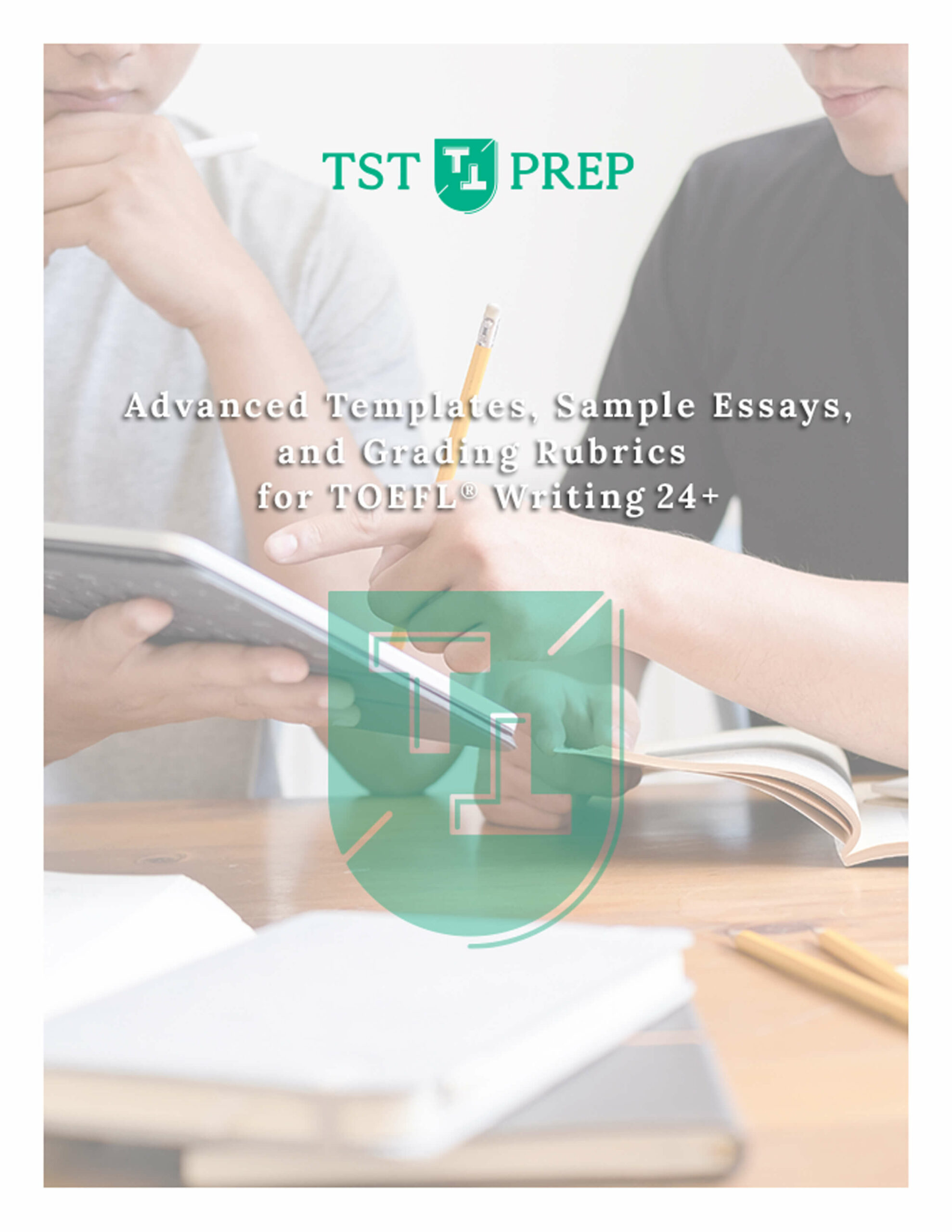
Looking for more example essays?
Download our TOEFL Writing 24+ Guide if you would like more sample essays. It includes extra tips, tricks, and strategies you will not find anywhere else. Download it for free here
Too complicated? Don’t worry.
I will share TOEFL writing templates for the Integrated Writing question, which will make your life a whole lot easier.
We have to talk about the Writing for an Academic Discussion question.
Writing for an Academic Discussion Question
You will have 10 minutes to complete the Writing for an Academic Discussion question .
For this task, you will participate in an online discussion. After you read the question and student responses, you will have to write a response that adds to the conversation.
Here’s the breakdown:
Writing for an Academic DiscussionTime Management | |
|---|---|
| Scan the discussion and plan | |
| Write your response | |
| Edit your response | |
This question is straightforward, but let’s do a sample together.
When the question appears on the screen, take two minutes to scan the passage and the student’s opinions.

Start to write your response. Be sure to add to the discussion and avoid repeating the same points as the other students.
Aim to write at least 120 words.
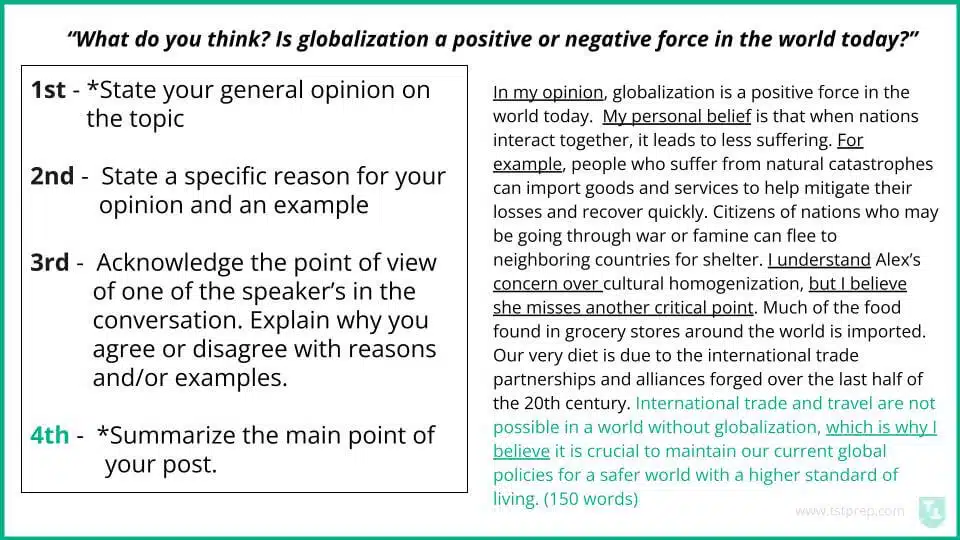
Get peace of mind with these TOEFL Writing Templates
Now that you have a few TOEFL Writing topics and sample essays to study from, you may want to use a writing template to help guide your writing.
A TOEFL template is basically a pre-organized set of words and phrases that you can use in almost any TOEFL Writing response.
Here’s TST Prep’s template for the integrated TOEFL Writing question (question one) :
The article introduces the topic of (general topic). More specifically, the writer discusses (stance of the author on the topic). The lecturer in the listening passage disagrees. He believes that (stance of the professor on the topic) and attacks each of the claims made in the reading.
In the reading, the author begins by stating that (first point made to support stance). The lecturer, however, disagrees. He states that (first counterargument by the professor). He goes on to say that (additional detail about first counterargument).
The author also claims that ( second point made to support stance). Again, the lecturer believes there are flaws in the writer’s argument. The speaker holds that (two sentences about the professor’s second counter-argument).
Another reason why the author feels that (restate stance of author ) is that ( third point made to support stance). The professor in the listening passage is doubtful that this is accurate. He suggests that (two sentences about the professor’s third counter argument ).
To sum up, both the writer and professor hold conflicting views about (general topic). It’s clear that they will have trouble finding common ground on this issue.
And here’s our template for the independent TOEFL Writing for an Academic Discussion (question two) :
BASIC TEMPLATE: QUESTION 2 (Writing for an Academic Discussion) | ||
|---|---|---|
| opinion on the topic | , globalization is a positive force in the world today. | |
| is that when nations interact together, it leads to less suffering. , people who suffer from natural catastrophes can import goods and services to help mitigate their losses and recover quickly. Citizens of nations who may be going through war or famine can flee to neighboring countries for shelter. | ||
| I totally agree with _____ point about ____, and I would like to add _______. | .Alex's cultural homogenization, . Much of the food found in grocery stores around the world is imported. Our very diet is due to the international trade partnerships and alliances forged over the last half of the 20th century. | |
| it is crucial to maintain our current global policies for a safer world with a higher standard of living. | ||
You will notice that the sample essays in this article differ from the templates.
You do not have to use templates, it’s up to you. Some people prefer to write in their own unique fashion for the entire exam. However, you will notice that the structure of the templates is similar to the TOEFL example essays.
These templates follow the exact organization and structure you are expected to use on test day, so don’t hesitate to use them in your writing.
Also, don’t forget to download the free 24+ TOEFL Writing Guide if you would like more example essays, templates, and exclusive tips to help you earn the best possible TOEFL Writing score on test day.
If you read this far, it means you are serious about your TOEFL studies. Don’t hesitate to send us an email and let us know how we can help you earn the TOEFL score of your dreams – [email protected]
Did we forget anything? Please comment and let us know how we can improve our TOEFL Writing advice (or if you want to just say hi that would be great too).
Other articles
Ten Awsome Tips for the Writing Section of the TOEFL Test
100 Free Questions for the Listening Section of the TOEFL Test
Check other articles on TOEFL
113 Comments
Hello, Josh. Firstly, thanks for the useful tips. I wonder if I can get a point if I don’t understand the lecture but write everything about reading. Should every idea in the passage and audio be matched?
Hi Ella, Thanks for your question. In general, the listening points should correspond with the reading. This is because the listening usually argues the opposite points.
Hi, Josh. I have a question about copying and pasting in TOEFL writing. I heard some TOEFL teachers say it should be avoided because ETS will consider it a potential form of plagiarism in future academic study.
Could you please provide some suggestions in terms of this issue? Is it ok to copy and paste, since it saves a lot of time in writing, especially on the test day. Thank you!
Great question. The copy-and-paste feature will not work at the test center, and I do not believe it works on the Home Edition either. Regardless, copying and pasting or manually copying the exact words should be avoided. You are always better off putting the answer into your own words.
Hello Josh, I have a question regarding how we can write an advanced writing that will be scored 25+?
Thanks very much for your question. We do have some templates that can help to increase your score. However, to give you a more detailed answer, I would suggest you consider doing an essay evaluation with us so we can help you determine specific areas for improvement. In the meantime, here are some articles that can help.
https://tstprep.com/articles/toefl/ten-awesome-tips-for-the-writing-section-of-the-toefl-test/
https://tstprep.com/articles/toefl/sample-essays-for-the-writing-section-of-the-toefl-test/
Hi Josh! For the academic writing, I only gave my reason for the topic, and I forgot to mention the opinion of the other student. I checked my word count. It is already past 100 words, and I do not want it to be too long. Do we really need to mention the other students’ opinion?
Hi Ireen. Great question! We often suggest mentioning one of the other students, but it is not required. As long as what you said was on topic, you “added to the discussion,” and gave specific reasons and examples, you should be okay with the 100 words you wrote.
Hello, I have a question about the independent writing: Is it a problem if I just give one reason in my essay (but detailed enough)? Thank you
Hi there and thank you for your question. There are no specific grading criteria that say you MUST give two reasons for your opinion, so, in theory, yes, you can just give one reason. I don’t think you will be marked down for it. If possible, try to give two though. It will make your word count higher.
Hello Josh, I was wondering if you have more integrated writing questions that we could do for practice, do you know where to find them?
Hi there and thank you for your question. If you search “TOEFL Writing Practice test” on Youtube you will find 2-3 TST Prep practice videos with an Integrated Writing practice question. I’m sure there will be tests from other providers as well.
Hey Josh, I have been following your YouTube channel for my TOEFL preparation, where I learned a lot. My question is that I got stuck between 15-17 scores in the reading section and could not figure out what I would do to enhance my scores. Any suggestions?
Hi there Ashina, and thank you for your question.
It is, indeed, a difficult question to answer. Here are two pieces of advice on how to practice at home and how to improve time management:
HOW TO DO A PASSAGE
I am going to breakdown the process you should go through when you do a TOEFL Reading passage:
1. Copy the test conditions (set a timer to complete the passage and all the questions in 18 minutes)
2. Check your answers
3. Identify the reason you got a specific question wrong (or didn’t understand why you were correct) and write down what you can do to avoid the same mistake next time. Step #3 is the most important and the one often overlooked because most test-takers are pretty tired after reading and answering questions. This will help you notice patterns in incorrect choices and apply what you have learned later.
4. (Optional) Do the same passage again two weeks later. (You will remember much of what you did before, but it should help remind you of what you have learned)
TIME MANAGEMENT
My advice is pretty simple here, practice with LESS TIME. If it is not too stressful, try to complete a passage and all of the questions in 16 minutes (instead of 18). This usually does the trick for most students over time.
I hope you find some of this helpful. Good luck, and let me know if you need anything.
Hey Josh, in the Reading section the last question holds two marks where we are asked to pick three choices. I have always have a hard time getting the perfect score here. any suggestions, please…
Hi Kiba, this is a popular complaint. I posted a video about summary questions here. You might find it helpful.
Hey Josh, I have a question. If the question is saying a good essay is between 200 and 300, and I wrote more than 300, is this okay? Or should I make it only as maximum as they are saying?
Hi Joud and great question. Definitely write MORE. There is a direct correlation between test scores and word count, so the more you write the better. Of course, that doesn’t mean you should write as much as possible as fast as possible, but anything between 350-450 words would be great.
Hey Josh, I think I do well in my writing section, but my score doesn’t improve. Is there anything that I can do to know my mistakes from the ETS?
Hi Aziz, good question, and unfortunately, no, they do not release that information. The best you can do is work with an experienced teacher who can point out your weaknesses and work on them at home before test day.
Submit a Comment
Your email address will not be published. Required fields are marked *
Cancel reply Submit Comment
This site uses Akismet to reduce spam. Learn how your comment data is processed .
Related Articles

TOEFL iBT® Paper Edition: Your Top 10 Questions Answered by ETS®
Registration has already begun for the brand new TOEFL iBT Paper Edition test, with the first tests scheduled to be administered in Colombia, Mexico, the United States, and India in December 2021.
Wait, wait, wait… what?
A TOEFL iBT Paper Edition? I thought you had to take the TOEFL iBT on a computer.

Complete Practice Test for the TOEFL® Test
What you need is a free and complete TOEFL practice test with an answer key that explains the answer to each question. Not only that, but this test should include speaking responses and essay samples so you know how to speak and write on test day.
This is the free practice test you’ve been looking for.
And not only do you get access to a free TOEFL practice test, but we will also break down each section of the test and provide five study tips to help you improve your TOEFL score.

Questions, Topics and Sample Answers for the Speaking Section of the TOEFL® Test
TOEFL Speaking practice questions. You need them, we’ve got them.
And not only that, but we have included sample answers so you know exactly how to speak to score high on test day.
These TOEFL Speaking topics and sample answers were carefully crafted to show you the ideal structure for each question type. Check them out.

Duolingo English Test® vs. the TOEFL iBT®
Your dream is to study abroad, but the entire process is a massive headache. You have to fill out applications, research visa requirements, and prepare for exams.
One common requirement is an English language proficiency exam. You have probably heard about the TOEFL iBT® before, but there is a chance you might be able to take a new test: the Duolingo English Test®

Ten Awesome Tips for the Writing Section of the TOEFL® Test
We know it can feel impossible to write two complete essays in under 40 minutes! But that’s exactly what you have to do in the TOEFL Writing section.
That’s why we have compiled a list of ten of our best TOEFL Writing tips so you feel cool and confident on test day.

- Privacy Overview
- Strictly Necessary Cookies
This website uses cookies so that we can provide you with the best user experience possible. Cookie information is stored in your browser and performs functions such as recognising you when you return to our website and helping our team to understand which sections of the website you find most interesting and useful.
Strictly Necessary Cookie should be enabled at all times so that we can save your preferences for cookie settings.
If you disable this cookie, we will not be able to save your preferences. This means that every time you visit this website you will need to enable or disable cookies again.

TOEFL Prep Online Guides and Tips
What’s a good toefl writing score.
Have you been researching the TOEFL Writing section and are wondering what a good TOEFL iBT Writing score is? What TOEFL Writing score do you need to get into your top schools? What do graders look for in essays? What do you need to include in your essays to help you get the scores you need? We answer all those questions and more in our guide.
How Is the TOEFL Writing Section Scored?
First, let’s do a quick overview of the Writing section, and then we’ll look at how it’s scored. TOEFL Writing is the final section of the TOEFL. It lasts 50 minutes and contains two tasks: Integrated Writing and Independent Writing. You’ll have 20 minutes to plan and write the Integrated Writing Task and 30 minutes to plan and write the Independent Writing Tasks. Both essays will be typed on the computer.
After you complete the exam, your essays will be graded on a scale from 0-5. These are known as raw scores. The average of those raw scores will then be scaled to a score from 0-30, which is your official Writing score and the one you see when you get your score results.
Below is a conversion chart for raw and scaled Writing scores. The left column shows the average Writing raw score (from 0-5), and the right column shows the corresponding scaled score (from 0-30).
| 5.00 | 30 |
| 4.75 | 29 |
| 4.50 | 28 |
| 4.25 | 27 |
| 4.00 | 25 |
| 3.75 | 24 |
| 3.50 | 22 |
| 3.25 | 21 |
| 3.00 | 20 |
| 2.75 | 18 |
| 2.50 | 17 |
| 2.25 | 15 |
| 2.00 | 14 |
| 1.75 | 12 |
| 1.50 | 11 |
| 1.25 | 10 |
| 1.00 | 8 |
| 7 | |
| 5 | |
| 4 | |
| 0 |
The TOEFL Writing Rubrics
Below are the key points from the rubrics for both Writing tasks. ( You can view complete rubrics for both essays here .) You can see what you need to include in your essays in order to earn certain scores. After each rubric, we also give some analysis to help you understand what a top-scoring essay needs to include.
By the way: we have built the world's best online TOEFL course . Get online practice (TPO-sytle!) and individual grading and feedback on Speaking and Writing.
Learn how you can improve your TOEFL score by 15 points today .
The Integrated Writing Task
For this task, you will have three minutes to read a short passage, then you will listen to a short (approximately two-minute long) audio clip of a speaker discussing the same topic the written passage covers. You will have 20 minutes to plan and write a response that references both of these sources in order to answer the question. You won’t discuss your own opinion.
During the writing time, you’ll be able to look at the written passage again, but you won’t be able to re-hear the audio clip. You’ll be able to take notes while you listen to it though. The suggested response length for this task is 150-225 words.
| 5 | |
| 4 | |
| 3 | |
| 2 | |
| 1 | |
| 0 |
To score well on the Integrated Writing task, the most important thing you need to do is show the graders that you understood the main points of both the written passage and audio clip and were able to apply those points to the prompt. You need to be able to pick out the main points from both passages and show how they relate to each other and the prompt.
Your essay will also need to be well organized, and it must be very clear within the first few sentences what your thesis statement or main idea of your essay is. Additionally, a high-scoring essay won’t have many spelling or grammar errors.

The Independent Writing Task
For the Independent Writing task, you’ll receive a question on a particular topic or issue. You’ll have 30 minutes to plan and write a response to that topic that explains your opinion on it. You’ll need to give reasons that support your decision. It’s recommended that your response to this task be at least 300 words.
The Independent Writing task’s rubric is pretty straightforward. In order to earn a high score, your essay must:
- Fully answer the prompt: You must completely answer the essay prompt, and it must be clear from early on in your essay (definitely within the first paragraph) what your stance on the prompt is.
- Include specific examples: In order to back up your stance, you need to give specific examples and explain how they strengthen your position. This is one of the most important things you are graded on, and not having enough examples, not making them specific, or not explaining the examples well enough can cause you to get a significantly lower score.
- Be well organized: Your essay should have a clear introduction, body, and conclusion that flow together and form a clear and complete essay.
- Have few or no spelling and grammar errors: You don’t need to be perfect, but the graders shouldn’t have trouble understand what you’re trying to say due to misspellings or grammar mistakes.
What’s a Good TOEFL Writing Score?
So your TOEFL iBT Writing score can be anywhere from 0 to 30, but what’s a good Writing score? There are two ways to define a good Writing score. The first is by using percentiles, and the second is by using score requirements for the schools you’re applying to. We’ll look at both methods in this section.
Using Percentiles to Determine a Good TOEFL Writing Score
Percentiles show how well you performed on the test compared to everyone else who took the TOEFL. The higher your percentile, the better you did on the TOEFL. For example, if you scored in the 40th percentile, that means you scored higher than 40% of everyone who took the TOEFL and lower than 60% of all the people who took it. And if you scored in the 95th percentile, then you did better than 95% of people who took the TOEFL.
Below are the raw and scaled scores that correspond to some key TOEFL Writing percentile ranks. Remember, each essay is given a raw score from 0-5, so your total raw score for both essays will be from 0-10. (You’ll only be given scores in whole points, but we used half points below for rounding.) Your raw score is then converted to a scaled score from 0-30, which is the score you’ll see on your score report.
| 90th | 27 | 9 |
| 75th | 25 | 8 |
| 50th | 22 | 7 |
| 25th | 19 | 6 |
| 10th | 15 | 4.5 |
You can use percentiles to determine what a “good” TOEFL Writing score is. You might define “good” as anything that’s above average, or the 50th percentile. Using that definition, any scaled Writing score higher than a 22 would be a good score. You might also define good as being in the top quarter of test-takers, or at least the 75th percentile. That would require a Writing score of at least 25.
An excellent Writing score in the 90th percentile would mean you scored higher than 90% of other test-takers on that section. This requires a score of at least a 27.
Using School Requirements to Determine a Good TOEFL Writing Score
While percentiles can be useful for getting a general idea of what a good score is, you’ll probably need more information to set your own TOEFL Writing score goal. The other, and usually more effective, way to figure out a good Writing score is to look at the TOEFL requirements of schools you’re applying to or thinking about applying to. Almost every university or graduate program will list its TOEFL requirements on its website, typically on the “Admissions” page.
Using this guideline, a good TOEFL Writing score is simply one that gets you into each of the schools you’re interested in. In the next section we go over step-by-step how to use school requirements to set your Writing goal score.

How to Set a TOEFL Writing Goal Score
Follow four steps below to figure out which TOEFL Writing score you should be aiming for. We’ll use Ivan, an international student applying to several universities in America, as an example.
#1: Make a List of the Schools You’re Interested In
Your first step is to make a list of all the schools you’re interested in applying to. Then, put them in a table, like the one you see below. Right now you only need to fill in the first column. At this point, you don’t need to have a final list of the schools you want to apply to; a rough guide of schools you may be interested in attending is enough.
Ivan is applying to four schools: MIT, New York University, University of Wisconsin-Madison, and American University. Below is his table.
| MIT | |||
| NYU | |||
| UW-Madison | |||
| American University |
#2: Find Each School’s Average/Required TOEFL Scores
The next step is to find the required TOEFL Writing score and total TOEFL score for each school. Schools will usually post this information on their admissions page. Some schools have required scores for each TOEFL section. This makes it easy to know what the required Listening score is. For others, there is simply a required total TOEFL score. This means you’ll need to do a bit of math to figure out about what score you’ll need for Writing. To do this, just divide the required total score by four, since there are four sections on the TOEFL.
For example, UW-Madison has a required total score of 92. That means Ivan will need an average of 23 on each section, including Writing, to meet that total score requirement. You may want to make a note that this is just an estimated minimum Writing score, and not required.
| MIT | 25 (estimated) | 90 (100 recommended) | |
| NYU | 25 (estimated) | 100 (recommended) | |
| UW-Madison | 23 (estimated) | 92 | |
| American University | 20 | 80 |
#3: Make Adjustments
Now you know the minimum requirements for your list of schools, but should you be aiming higher than those scores? Will getting higher than the minimum required score increase your chances of getting accepted? In most cases, the answer is no. Getting a TOEFL score that’s significantly higher than the requirements definitely won’t hurt your application, and it will likely make navigating an English-speaking school easier, but, in most cases, it won’t help your application that much.
Most schools choose their TOEFL requirements based on the language skills they believe are required to do well there. As long as you meet the requirement, it’s assumed you’ll be able to manage the language barrier well enough. However, this isn’t true for every school, and there are some schools where a higher than required TOEFL score can help improve your chances of getting in.
Sometimes this is mentioned directly on a school’s website. The admissions page may state that any TOEFL score that meets or exceeds the requirements is enough, or it may say that scores higher than the requirement help your application. For example, MIT has a required TOEFL score minimum of 80, but a total score of at least 100 is “recommended.” In this case, you should be aiming for a total score of 100 in order to be sure your TOEFL score doesn’t bring down the rest of your application.
Other schools don’t require TOEFL scores if you meet other requirements, such as a certain number of years of schooling at an English-speaking school or a high enough score on the Critical Reading section of the SAT.
Next to each school, include any of this additional information you find to give yourself the most complete picture of what TOEFL score you should be aiming for. If you can’t find this information on the school’s website, it’s a good idea call or email the admissions office directly to be sure you have the most accurate information.
| MIT | 25 (estimated) | 90 (100 recommended) | 100 recommended |
| NYU | 25 (estimated) | 100 | No minimum required score, but recommended at least 100. |
| UW-Madison | 23 (estimated) | 92 | |
| American University | 20 | 80 | Each sub-score must be at least 20 |
#4: Find the Highest Score From Your List
Now that you have your list of required and desired TOEFL scores for the schools you’re interested in, look through the list and find the highest score. This is your goal score, and getting it would mean you got a “good” TOEFL score since it would meet the requirements of all the schools you’re interested in.
For Ivan, he would need a Writing score of at least 25 in order to have the best chance of meeting the requirements of all the schools he’s applying to. Once you’ve found this score, write it down and tape it somewhere where you’ll see it, such as your desk. Keep it visible while you’re studying to remind you of the score you need to earn and motivate you to reach your TOEFL goal.

Tips for Getting a Top TOEFL Writing Score
It’s important to know how the TOEFL essays are scored and what score you should aim for on TOEFL Writing. Follow these four additional tips in this section to help produce strong essays that’ll help you meet your goal score.
Tip 1: Take a Few Minutes to Plan Your Essays
Since you only have a limited amount of time to complete your essays, it can be tempting to start writing the second your time starts. You want to avoid doing this, however. Spending just a few minutes planning your essay can help keep your writing focused and on topic, and it can often help you write faster because you know what you’ll be discussing next.
Spend a max of two to three minutes writing a basic outline for your essay. It should include:
- Your thesis statement (the main point you’re making and will discuss throughout the essay)
- The main point of each paragraph you’ll have in your essay
- Any specific examples you can quickly think of (either from the included passages or your own opinion, depending on the essay) to back up your claim
Before you begin writing, reread the essay prompt again to make sure your outline answers the question well (see next section for more details).
Tip 2: Discuss Specific Examples
For both essays, you’ll need to provide multiple examples that support your main argument. For the Integrated Writing Task, these examples will come from the written passage and the audio clip included with the essay prompt. For the Independent Writing Task, you’ll need to come up with your own ideas for examples.
One thing many test takers struggle with is making these examples specific enough. For example, say you’re writing an Independent Writing essay that focuses on the importance of telling the truth. If one of your points is that sometimes you need to tell small lies to protect a friend’s feelings, don’t just say that being honest can be cruel. Give a specific example instead. For example, says a friend asks whether you like her new hat. Even if you really think it’s ugly, it doesn’t harm anyone to say you like it, and it’ll help keep your friendship strong.
Using specific examples makes your argument stronger and can help you get a higher essay score.
Tip 3: Meet the Recommended Essay Lengths
It’s recommended that your Integrated Writing Task be 150-225 words and your Independent Writing Task be at least 300 words. You should aim to meet both these recommendations because writing less than that will make it difficult to meet all the requirements you need in a strong essay, like an introduction and conclusion and well-supported examples.
However, you don’t need to worry about writing a lot more than the recommended word counts. For example, an Independent Writing Essay that’s 600 words won’t automatically get a higher score than one that’s 350 words. Aim to write the recommended length for each essay, but focus more on giving strong examples than simply writing in order to increase your word count.
Tip 4: Proofread Your Essays
You should always aim to leave at least a few minutes at the end of the section to proofread your essays. Ideally, you’ll have 2-3 minutes to look over each essay, but even just a minute of extra time can be enough for you to find and fix obvious spelling and grammar errors.
While you can have some errors and still get a high essay score, it’ll be difficult to get a top score if your essays are filled with misspellings and grammar mistakes, even if the content of the essays is strong. Taking a few minutes to correct these errors can give your essay scores a boost.
Recap: What’s a Good TOEFL Writing Score?
What’s a good TOEFL iBT Writing score? That depends on your definition. If you’re basing your score on percentiles, or how well you do compared to other test-takers, a scaled score of 22 will make you above average, and a score of 25 will put you in the top quarter of Writing scores for test takers.
However, it’s better to look at the score requirements of the schools you’re interested in and base your goal score for Writing on that. You’ll need to write two essays, and for each, you’ll need to answer the prompt completely, provide specific and well supported examples, and keep spelling and grammar errors to a minimum in order to get a high score.

What’s Next?
Want more tips on how to prepare for TOEFL Writing questions? Check out our guide to over 300 Writing topics to practice with!
Looking for more information on the TOEFL Writing section? Learn all the tips you need to know in order to ace TOEFL Writing!
What does a high-scoring TOEFL essay look like? Take a look at our analyses of two perfect-scoring TOEFL essays to learn what you can do to get a high essay score on test day.
Ready to improve your TOEFL score by 15 points?
Author: Christine Sarikas
Christine graduated from Michigan State University with degrees in Environmental Biology and Geography and received her Master's from Duke University. In high school she scored in the 99th percentile on the SAT and was named a National Merit Finalist. She has taught English and biology in several countries. View all posts by Christine Sarikas
Enjoy this post? Rate it!

TOEFL integrated writing task 2023 | Examples and sample essay.
Want to excel in the toefl writing task elevate your skills with the most up-to-date examples, carefully crafted sample essays, and insights in 2023. maximize your potential to succeed in the integrated writing task., table of contents, introduction, toefl integrated writing task structure and format , toefl writing task topics , toefl writing task sample , toefl writing task pdf and other resources , strategies for toefl integrated writing task , scoring criteria for toefl writing task , key tips for success , example 1: environmental conservation , example 2: technological advancements in medicine , introduction: , body: , key takeaways .
TOEFL (Test of English as a Foreign Language) is a critical stepping stone for students who aspire to study in English-speaking universities. The TOEFL writing task is one part of this examination that can often become a cause for concern. It not only tests your ability to understand English but also your ability to express thoughts, ideas, and opinions in a clear and precise manner.
In this comprehensive guide, we will explore various aspects of the TOEFL writing task, including topics, samples, format, and specific answers to common questions. The information provided is tailored to the 2023 edition of the test, ensuring relevance and applicability to your preparation. So, if you’re planning to take on this challenge in 2023, let’s begin by understanding the structure and requirements of the TOEFL writing task.
The TOEFL integrated writing task is the first of the two writing tasks in the TOEFL exam. It’s designed to assess your ability to combine listening and reading skills to write a coherent and well-structured essay. Here’s a detailed breakdown:
- Reading passage : A passage around 200-250 words long is provided. You’ll have three minutes to read it.
- Listening clip : A short lecture related to the reading passage is played. You’ll be given time to take notes to remember the content better.
- Writing task : You will have 20 minutes to write a response of about 150-225 words, summarizing the points made in the lecture and explaining how they relate to specific points in the reading passage.
The topics for the TOEFL integrated writing task are generally academic and range from subjects like history, science, art, and social sciences. Here’s an example of how the topics will be given:
- Reading passage : An excerpt will be provided about Renaissance art and its influence.
- Listening clip : A lecture discussing a specific Renaissance painting.
- Writing task : Compare and contrast the information in the reading passage and the lecture.
Practicing in advance by working on such topics will help you write and format your writing tasks better. Here’s a sample for you to practice:

- Reading passage: Brief description of climate change and its effects.
- Listening clip : A lecture discussing various solutions to combat climate change.
- Writing task : Summarize the solutions from the lecture and relate them to the problems mentioned in the reading passage.
To support your preparation, TOEFL writing task PDF materials, containing practice questions and samples are available online. These resources often include:
- Guides on TOEFL writing format
- Collection of TOEFL writing samples with answers PDF
- TOEFL writing task 1 sample answers and TOEFL writing task 2 sample answers
- Practice tests for TOEFL writing task 2
These materials are instrumental in understanding the pattern and honing your skills to succeed in the TOEFL writing task.
- Understanding the structure : Familiarize yourself with the TOEFL writing format, including reading, listening, and writing phases.
- Time management: Allocate time for reading, note-taking, and writing, keeping in mind the 20-minute time limit for the writing task.
- Note-taking skills : Practice jotting down crucial points from both the reading passage and the listening clip. Focus on the main ideas, supporting details, and the relationship between the reading and listening parts.
- Creating an outline : Before diving into writing, create a rough outline to organize your thoughts. This helps in maintaining coherence and connection between various sections of the essay.
- Practicing with samples : Utilize the TOEFL writing task sample, TOEFL writing task 1 sample answers, and TOEFL writing task 2 sample answers for regular practice.
Understanding the scoring can guide you in preparing effectively. The TOEFL integrated writing task is scored on a scale of 0-5 based on the following criteria:
- Content : Accuracy, completeness, and connection between reading and listening.
- Organization : Logical progression, clear introduction, body, and conclusion.
- Language use : Grammar, vocabulary, sentence structure, and overall fluency.
- Use transitional phrases : Transitional words like “however,” “in addition,” and “therefore” can help in maintaining the flow.
- Avoid repetition : While using keywords is vital, avoid unnecessary repetition. Make sure your content is varied and engaging.
- Proofread : Reserve some time at the end for revising and correcting errors.
- Access Quality Resources : Consider TOEFL writing samples with answers PDF, TOEFL writing task PDF guides, and practice tests for well-rounded preparation.
- Tables, quizzes, and other interactive elements: Incorporating tables and quizzes can be an excellent way to enhance the learning experience. For instance, a table comparing different TOEFL writing task topics or a quiz testing understanding of TOEFL writing format can be included in online learning platforms or books.

Examples of TOEFL integrated writing task
The TOEFL integrated writing task presents a unique challenge to assess your ability to analyze information from both a reading passage and a lecture. In this task, you must demonstrate your comprehension of the material and your capacity to connect ideas between the text and the spoken content. To give you a clearer picture, let’s dive into a few illustrative examples of TOEFL-integrated writing tasks:
Reading passage : Description of deforestation and its impact on biodiversity.
Listening Clip : A lecture discussing various conservation methods employed globally.
Writing task:
- Reading: The passage highlights the critical loss of forests, leading to a decline in biodiversity and environmental balance.
- Listening: The speaker introduces multiple conservation techniques such as reforestation, wildlife corridors, and legal enforcement.
- Essay: The essay must summarise the conservation methods mentioned in the lecture and relate them to the problems of deforestation and biodiversity loss detailed in the reading passage.
Reading passage: An overview of the traditional medical practices and their limitations.
Listening clip: A lecture elaborating on recent technological advancements in medical diagnostics and treatments.
Writing task :
- Reading: The passage outlines traditional medical practices, emphasizing their limitations in accuracy and efficiency.
- Listening : The lecturer elaborates on cutting-edge technologies like AI-powered diagnostics, robotic surgeries, and personalized medicine.
- Essay : The essay should connect the advancements discussed in the lecture with the limitations outlined in the reading passage, showcasing how technology is revolutionizing medical practice.
In-depth Analysis of a Sample Essay | Environmental conservation
The essay must have a good flow and cohesiveness. This makes it easier to understand and leave a good impression. Here is the in-depth analysis of an essay on environmental conservation.
“The loss of forests and biodiversity has long been a global concern. However, modern conservation methods, as described in the lecture, offer promising solutions to the challenges outlined in the reading passage.”
- Paragraph 1: Discuss reforestation, its importance, and how it directly addresses deforestation.
- Paragraph 2: Explore wildlife corridors and their role in preserving biodiversity.
- Paragraph 3 : Explain legal enforcement, international agreements, and their impact on conservation efforts.
- The TOEFL-integrated writing task involves reading, listening, and writing. Understand the flow and practice each part.
- Make use of TOEFL writing samples with answers PDF, TOEFL writing task PDF guides, and various other materials for practice.
- Your essay should logically connect the reading and listening parts, maintaining a clear and concise structure.
The innovative conservation techniques described in the lecture provide a comprehensive approach to combating the grave issues of deforestation and biodiversity loss mentioned in the reading passage. These methods signify hope and progress in environmental preservation.
We hope you found this article insightful. If you have any more queries please reach out to us and get them solved quickly!
Liked this blog? Read: TOEFL requirements 2023 | Documents and minimum requirements guide.
1. How much time do I have for the TOEFL Integrated Writing Task?
Ans. You have 3 minutes to read the passage, a listening time for the clip, and 20 minutes to write the essay.
2. Can I take notes during the listening part of the TOEFL Writing Task?
Ans. Yes, taking notes is allowed and advisable during the listening portion.
3. What types of topics are covered in the TOEFL Writing Task Topics?
Ans. Topics are typically academic, ranging from history, science, art to social sciences.
4. Where can I find TOEFL Writing Task 1 sample answers and TOEFL Writing Task 2 sample answers?
Ans. Various online platforms, prep books, and official TOEFL guides provide these samples.
How useful was this post?
Click on a star to rate it!
Average rating 3.3 / 5. Vote count: 3
No votes so far! Be the first to rate this post.
People also liked

IELTS success| Tips to master each section
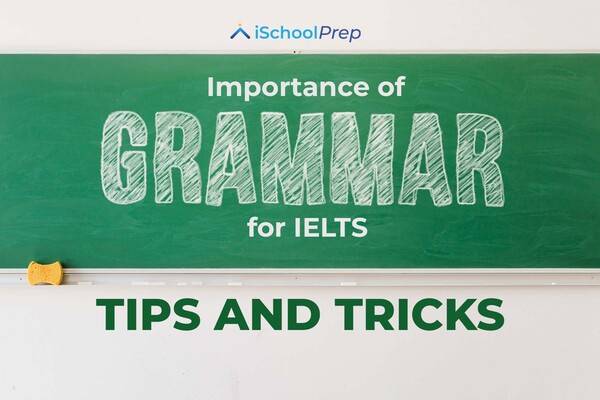
Importance of IELTS grammar | Tips and tricks

TOEFL and IELTS | Role of contextual & academic words
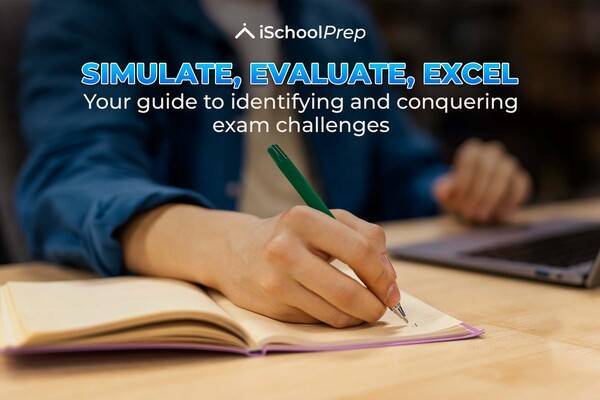
Simulated tests | Opportunity to overcome challenges
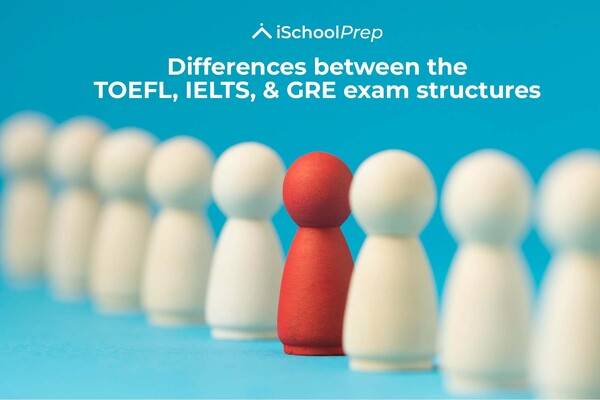
TOEFL, IELTS, & GRE exam structure | Key differences 2024!

Ace the GMAT exam | Navigate quant & verbal difficulties!
Leave a reply cancel reply.
Your email address will not be published. Required fields are marked *
Start your journey with iSchoolPrep
Need help with your Test Preparations? Contact Us for more details
Inquire Now
Get e-books, expert guidance, live classes and more....
- TOEFL Writing Correction Topics
- OET Mock Tests
- Writing Correction
- Speaking Mock Test
- Reading Course
- Listening Practice Tests
- FREE Practice Tests
- IELTS Writing Correction
- IELTS Speaking Practice
- OET Writing Correction
- OET Reading Course
- OET Speaking Mock Test
- TOEFL Writing Correction
- PTE Writing Correction
- OET Listening Practice Tests
- OET (Occupational English Test)
- PTE (Pearson Test of English)
Breakdown of the TOEFL Writing Section
| Exam Date | Booking From - To | Result Date |
|---|
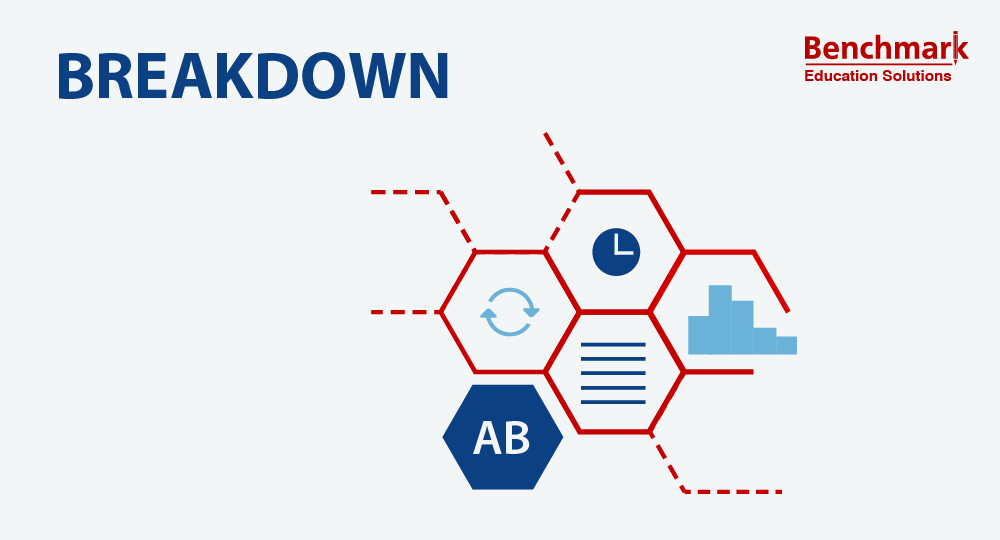
The TOEFL Writing Section is the fourth and final section of the TOEFL exam. In 50 minutes, you will have two writing tasks to complete: 1. The Integrated Writing, and 2. The Independent Writing. You will have 20 minutes to complete the Integrated Writing Task first, and then 30 minutes to complete the Independent Writing Task .
TOEFL WRITING TASKS
First you have the Integrated Writing Task. You will have to read a passage and listen to a speaker before writing your essay . The first part is the reading passage which is approximately 250-300 words. You will have 3 minutes to read this passage. Next, you will listen to a lecture about the topic from passage you just read. This audio clip is typically 2-3 minutes long. Then you will have 20 minutes to write about the topic using information from both the reading and listening passages.
For the TOEFL Independent Writing, you will be given a question relating to topic which asks for your opinion. You will have 30 minutes to outline and write about your opinion on the topic.
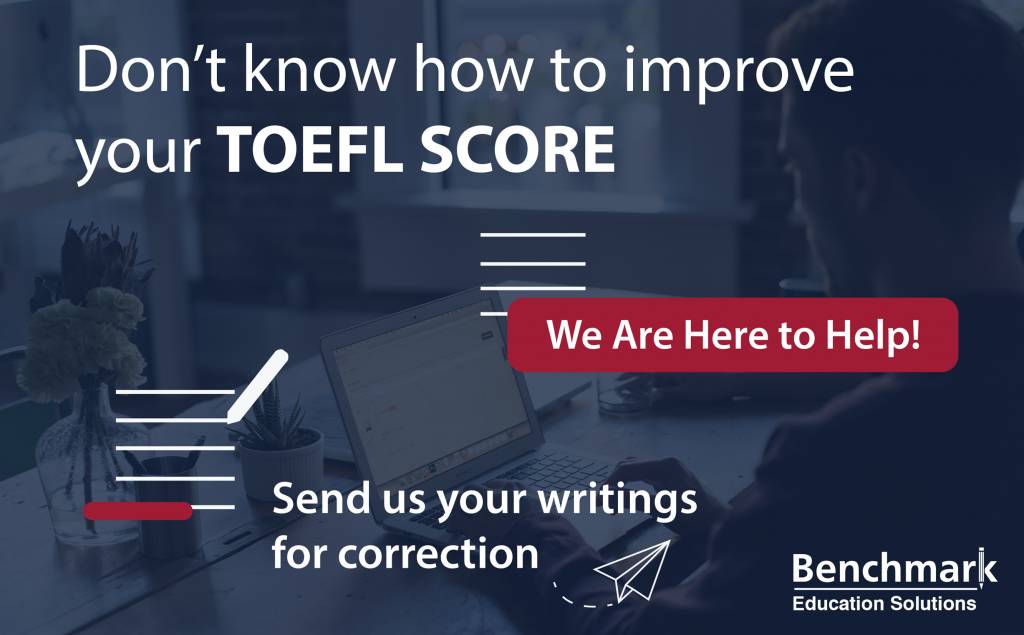
LENGTH OF THE TOEFL WRITING TASKS
The TOEFL suggests an Integrated Writing that is 150-225 words, but we recommend writing 250-300 words. This should not be difficult because you have a lot to cover. Your Integrated Writing essay must include the three main points that the author makes in the reading passage about the topic, and the lecturer’s three responses to the author’s main points. It should also include supporting reasons for those main points.
The TOEFL suggests an Independent Writing that is 300-325 words, but we recommend writing 350-400 words. Unlike the Integrated Writing, your Independent Writing essay should be all about your opinion of the topic. Often these questions are designed for you to pick a side of a controversial argument, state your preference between two or three conflicting options, or explain why you agree or disagree with a given statement. These questions are very similar to the questions on the Speaking Section , Task #2. It is important to only choose one of the options or sides of the argument to write about, and to include at least two reasons for your opinion with detailed personal examples.
SCORING ON THE TOEFL WRITING SECTION
Like the other sections of the TOEFL, the Writing Section, it is worth 30 points (out of 120), or 25%, of your overall TOEFL score . Two to four ETS graders will mark your writing from 0-4, which is then converted to the 30-point scale. In order to receive a top score, your essays must not only have few spelling and grammar mistakes, but also be well-organized and complete.
On the Integrated writing, you must demonstrate in your essay that you understood the main points and counterpoints of the author and lecturer. It is important to know which argument comes from which source, and to include some of the supporting reasons for their positions on the topic in your essay.
A high-scoring essay on the Independent Writing has strongly expressed opinions with supporting reasons. This means that even if you don’t have a strong opinion on the topic, it is better for your score to pretend to be passionate about your position. Make sure you include at least two supporting reasons for your opinion, and then explain each of these reasons with a personal experience.

Leave a Reply Cancel reply
Your email address will not be published. Required fields are marked *
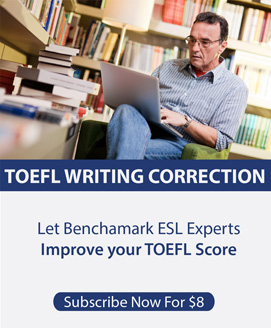
- TOEFL Writing
- TOEFL Integrated Writing
- TOEFL Independent Writing
- TOEFL Writing Practice
- TOEFL SAMPLE ESSAYS
- TOEFL Reading
- TOEFL Speaking
- TOEFL Listening
- TOEFL Grammar

- Study Abroad Get upto 50% discount on Visa Fees
- Top Universities & Colleges
- Abroad Exams
- Top Courses
- Read College Reviews
- Admission Alerts 2024
- Education Loan
- Institute (Counselling, Coaching and More)
- Ask a Question
- College Predictor
- Test Series
- Practice Questions
- Course Finder
- Scholarship
- Netherlands
- New Zealand

TOEFL Writing Score: Score Calculation, Marking Criteria, and Marking Rubric

- Result & Counselling
- TOEFL Score Validity
- TOEFL I BT Speaking Score
- TOEFL Listening Score
- TOEFL Speaking Score
- TOEFL Reading Score
- TOEFL Average Score
- TOEFL Score Range
- TOEFL I BT Score
- TOEFL Scores Required For Ivy League
- TOEFL Score Report
- What Is A Good TOEFL Score
- TOEFL For Canada Immigration
- TOEFL Highest Score
- TOEFL Minimum Score
- TOEFL Score Required For Australian Immigration
- GRE And TOEFL Scores For Top US Universities
- TOEFL Scores
.png?h=35&w=35&mode=stretch)
Shubhankar Das
Content Writer Study Abroad Exams | Updated On - Jun 24, 2024
Highlights:
- Top-ranked universities worldwide requires 25+ TOEFL writing score .
- TOEFL score between 24 and 30 shows an advanced level of proficiency.
- TOEFL writing score rubric scaled on 0 to 6 level , that evaluates your response.
- TOEFL writing scores ranging between 24 and 30 refer to the C1 CEFR level .
TOEFL writing section is divided into two tasks, and the total score ranges from 0 to 30 . TOEFL writing score contributes 25% of your total score. TOEFL has updated this exam syllabus, and the writing section had major changes. TOEFL writing section became shorter and now includes new writing for an academic discussion task. You are achieving a TOEFL writing score scale between 24 and 30 shows an advanced level proficiency . Top-ranked universities worldwide requires on average 25+ TOEFL writing score. Understanding TOEFL writing score rubric is very important for writing a perfect answer.
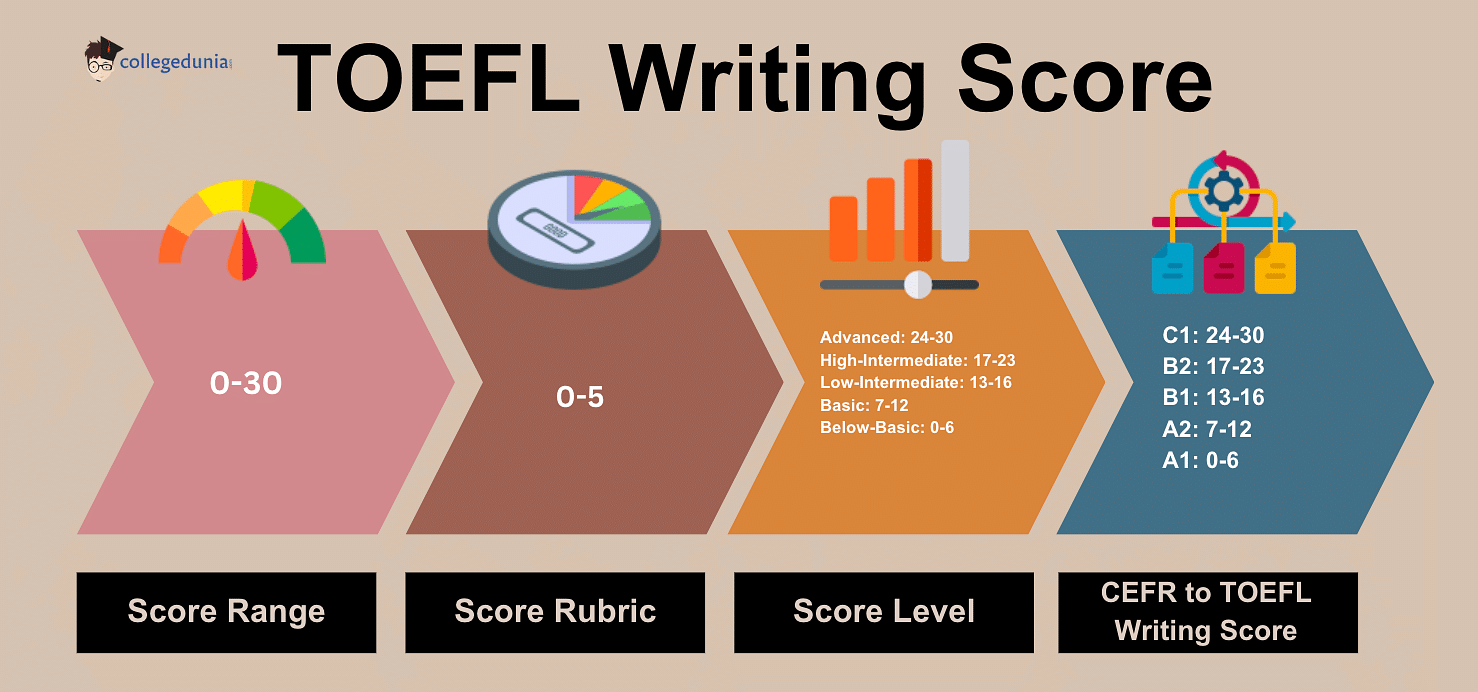
|
|
TOEFL Writing Section Description
Before understanding the score calculation process, let’s understand the contents of the TOEFL writing criteria. The test-takers have 2 tasks here
- Integrated writing task
- Independent writing task
The following table shows the exam pattern of TOEFL writing tasks:
| Task Type | Integrated Writing Task | Writing for an Academic Discussion Task |
|---|---|---|
| Direction | Write an essay after reading a passage and listening to a recording of a lecture. | State and support an opinion in an online classroom discussion. |
| Word Count | 150-225 words | 100 words |
| Time | 20 minutes | 10 minutes |
TOEFL Writing Score Conversion
TOEFL writing sections have a specific number of questions and the candidates obtain a raw score based on the number of correct answers given. This is the raw TOEFL score and this raw TOEFL score is converted into the scaled score on a scale of 0-30. The candidates can check the TOEFL IBT writing conversion table for this purpose.
| Writing Raw Score Average | Scaled Score |
|---|---|
| 5.00 | 30 |
| 4.75 | 29 |
| 4.50 | 28 |
| 4.25 | 27 |
| 4.00 | 25 |
| 3.75 | 24 |
| 3.50 | 22 |
| 3.25 | 21 |
| 3.00 | 20 |
| 2.75 | 18 |
| 2.50 | 17 |
| 2.25 | 15 |
| 2.00 | 14 |
| 1.75 | 12 |
| 1.50 | 11 |
| 1.25 | 10 |
| 1.00 | 8 |
| - | 7 |
| - | 5 |
| - | 4 |
| - | 0 |
TOEFL Writing Score to CEFR Level
Some of the top-ranked universities published their language score requirements on CEFR level. You can refer to the table below to understand the conversion of TOEFL iBT score to CEFR level:
|
|
|
|
|
|
|
|
|
|
|
|
|
|
|
|
|
|
|
|
|
|
|
|
TOEFL Percentiles Writing Score
Percentiles indicate how well candidates fared on the test. The greater your TOEFL score , the higher the percentile. For example, a candidate who scored in the 40th percentile scored more than 40% of all individuals who took the TOEFL but lower than 60% of all people who took it. The raw and scaled scores that correlate to some of the most important TOEFL Writing percentile levels are listed below. Remember that each essay is assigned a raw score ranging from 0 to 5, therefore your total raw score for both essays will range from 0 to 10. The raw score of the candidate is then translated to a scaled score ranging from 0 to 30, which is the number you'll see on your score report.
| 90th | 27 | 9 |
| 75th | 25 | 8 |
| 50th | 22 | 7 |
| 25th | 19 | 6 |
| 10th | 15 | 4.5 |
To establish what a "good" TOEFL Writing score is, candidates must consider percentiles. "Good" might be defined as anything above average or in the 50th percentile. Using that criterion, any scaled Writing score better than 22 is considered good. Candidates may alternatively define good as being in the top quarter of test takers, or at the very least in the 75th percentile. That would need a minimum writing score of 25. A 90th percentile Writing score would suggest you outperformed 90% of other test takers on that part. This requires a minimum score of 27.
TOEFL Writing Score: Marking Criteria
The following tables show the marking rubrics of TOEFL writing evaluation criteria for the integrated writing task and TOEFL independent writing task:
Marking Rubric of TOEFL Integrated Writing Task
Essays on the TOEFL iBT's writing section are graded with distinct rubrics for the independent and integrated writing tasks. Both are graded on a scale of 0 to 5. The marks obtained for TOEFL integrated writing task shows:
| Rating | Description |
|---|---|
| 5 | Excellent selection of the most important information from reading passage and recording Accurate presentation with no or very few grammatical errors |
| 4 | Good selection of the information from reading passage and recording Minor accuracy and vagueness or Slight lack of clarity |
| 3 | Well connected to the topic of the passage and recording Unclear and general information The major key point may be missing Incomplete sentences or inaccurate grammar use |
| 2 | The essay uses some relevant information from reading passage and lecture Misinterpretation of the topic or Multiple spelling, and grammar errors |
| 1 | Very little meaningful information or Use of extremely low level of language |
| 0 | No essay or Merely copied from the passage or recording with erred grammar. |
Marking Rubric of TOEFL Writing for an Academic Discussion Task
TOEFL writing exam pattern has recently updated. TOEFL integrated writing task was removed and a new writing for an academic discussion task has added.
|
|
|
|
|
|
|
|
|
|
|
|
|
|
|
|
|
|
|
|
|
Ques: What is a good TOEFL writing score?
Ans: The total TOEFL writing score ranges on a scale of 0 to 30 level. Achieving a score of 25+ is considered a good score and is accepted by most of the top-ranked universities worldwide.
Ques: How to calculate TOEFL writing score?
Ans: TOEFL writing score rubrics scale from 0 to 5, and then the raw score then calculated to the overall score. Your TOEFL writing score ranges on a scale of 0 to 30 level.
Ques: How to score 30 in TOEFL writing?
Ans: Achieving a score of 30 in TOEFL writing may be challenging. To achieve a high score, you need to practice regularly under expert mentorship.
Ques: Is 25 in TOEFL writing good?
Ans: TOEFL Writing score ranges between 0 and 30 level, and achieving a score of 25 is considered a good writing score. Most of the top-ranked universities worldwide require a 25+ TOEFL writing score.
Ques: How to increase TOEFL writing score?
Ans: To improve TOEFL writing score, practice reading and listening, practice note-taking skills, and improve your time-management skills. Regular practice with sample papers will help you to improve your score.
Ques: How to pass TOEFL writing?
Ans: To pass TOEFL writing easily read and summarize articles, listen to lectures in English lectures, and practice taking notes.
Ques: Is TOEFL writing difficult?
Ans: Difficulty level of TOEFL writing may vary by individual. Candidates with good preparation and a good grasp of the English language can easily achieve a good TOEFL writing score.
Ques: What is the minimum words for TOEFL writing?
Ans: You need to maintain a minimum of words of 150 to 225 words on integrated writing and 100 words on writing for an academic discussion task.
Ques: How many minutes is TOEFL writing?
Ans: You will be allocated 30 minutes to complete TOEFL writing section. The integrated writing task allocates 20 minutes and writing for an academic discussion task will require 10 minutes.
Ques: Is it possible to score 30 in TOEFL writing?
Ans: TOEFL writing score ranges on a scale of 0 to 30 level, and achieving the highest score may be challenging. Candidates with a good grasp of the English language and with effective preparation can achieve 30 in writing.
* The article might have information for the previous academic years, which will be updated soon subject to the notification issued by the University/College.
UNIVERSITIES/COLLEGES IN USA
UNIVERSITIES/COLLEGES IN CANADA
UNIVERSITIES/COLLEGES IN GERMANY
UNIVERSITIES/COLLEGES IN UK
UNIVERSITIES/COLLEGES IN AUSTRALIA
Masters In Physiotherapy In The Uk
Masters In Aeronautical Engineering In Uk
Masters In Aerospace Engineering In Uk
Mba In Germany For Free
Ms In Physics In Germany
Best Courses In Uk For Indian Students
Phd In Bioinformatics In Uk
Tier 1 Vs Tier 2 Business Schools
Best Product Management Courses In Canada
Best Mba Streams In The World
TOEFL Overview
TOEFL Pattern & Syllabus
TOEFL Registration
TOEFL Cutoff
TOEFL Preparation Tips
TOEFL Practice Papers
 (6).png?h=160&w=320&mode=stretch)
Study in Australia
 (4).png?h=160&w=320&mode=stretch)
Australia Accepts TOEFL Scores for Study Work and Stay...
 (5).png?h=160&w=320&mode=stretch)
Apply for a Job Seeker Visa in Australia with TOEFL Score...

TOEFL will Soon be Launched as a Personalized Test Based on Individual Requirements...
Want to know more?
Ask questions to our experts
SUBSCRIBE TO OUR NEWS LETTER

How to Score a 5/5 on the TOEFL Essay: Integrated Task
For many students taking the TOEFL, scoring a 5 out of 5 on each of the two TOEFL essays—which would lead to a perfect score of 30 in the writing section—is the ultimate goal. Getting there takes a lot of practice , but it pays off nicely! Scoring so high in one section can counterbalance slightly lower scores in other sections, helping you to get to your total target score with more ease (be sure to check your institution’s requirements, however; some universities will require a minimum score per section).
Because the two essays require slightly different skills, the ETS (the organization that administers the TOEFL) provides two separate rubrics for how to obtain a top score on the TOEFL essays. For those of you who are curious about the criteria for other scores, you can find that information here: at the test maker’s website . For those of you aiming to get a five, let’s keep going! Let’s start where the TOEFL writing section itself begins: with the integrated task.
The integrated essay will provide you with a lecture and a written passage on different aspects of the same topic. According to the ETS, the criteria for a top score on this essay include:

- Correctly selecting all important information
- Accurately and clearly representing the information.
- Showing good organization
- Having minimal errors in language use. If there are errors, they must not cause the information itself to become inaccurate or unclear.
Breaking that down, the first important task in getting that top score is going to be selecting the relevant information from the lecture, and then the reading. Good note-taking is vital here, and good note-taking takes practice! Listen to the emphasis that the speaker places on keywords, and look out for the thesis statement and supporting examples in the reading. Circle them in your notes.
The second important task is relating the lecture to the reading. Look at what you’ve circled. Does one contradict the other? Build on the other? Elaborate on a different aspect of the other? Figure out how they relate before you go on to the next important step: writing a well-organized response. To do this, you’ll want to create an outline.
Make sure that your outline has your thesis statement clearly defined. This thesis statement should explain how the lecture and the reading relate to one another. You’ll also want to have a brief summary of the lecture and the reading (one to two sentences is sufficient for this!) Then, build your body paragraphs around your main examples, which you’ll already have circled in your notes.
As you write, don’t worry about everything being perfect. That said, leave 2-3 minutes at the end of the exam to proofread what you’ve written. Because these essays are graded holistically, you won’t lose points for minor errors as long as they don’t change the meaning of your ideas. However, a lot of errors can add up to a confusing essay, which will definitely lead to a lower score.
The integrated task is only one of the two essays you’ll write on test day. Next time, we’ll take a look at the independent task, and how that differs from the integrated task you’ve mastered!

Rachel is one of Magoosh’s Content Creators. She writes and updates content on our High School and GRE Blogs to ensure students are equipped with the best information during their test prep journey. As a test-prep instructor for more than five years in there different countries, Rachel has helped students around the world prepare for various standardized tests, including the SAT, ACT, TOEFL, GRE, and GMAT, and she is one of the authors of our Magoosh ACT Prep Book . Rachel has a Bachelor of Arts in Comparative Literature from Brown University, an MA in Cinematography from the Université de Paris VII, and a Ph.D. in Film Studies from University College London. For over a decade, Rachel has honed her craft as a fiction and memoir writer and public speaker. Her novel, THE BALLERINAS , is forthcoming in December 2021 from St. Martin’s Press , while her memoir, GRADUATES IN WONDERLAND , co-written with Jessica Pan, was published in 2014 by Penguin Random House. Her work has appeared in over a dozen online and print publications, including Vanity Fair Hollywood. When she isn’t strategically stringing words together at Magoosh, you can find Rachel riding horses or with her nose in a book. Join her on Twitter , Instagram , or Facebook !
View all posts
More from Magoosh

Leave a Reply Cancel reply
Your email address will not be published. Required fields are marked *
Inside the TOEFL ® Test – Writing for an Academic Discussion Question
Video duration: 6:43
[MUSIC PLAYING]
Hi. I'm Michael from ETS, and welcome to Inside the TOEFL Test. Today, we're going inside the TOEFL IBT writing section-- specifically question 2, the writing for an academic discussion task.
(DESCRIPTION)
Map of the world.
So in the next few minutes, we're going to look at how the question is structured, how to approach the question, how your response is scored. We'll look at a sample response that received a high score, and will give you some tips for improving your writing skills.
So here's generally what the writing for an academic discussion task will look like. For this task, you're presented with an online academic discussion. A professor has posted a question about a topic, and some classmates have responded with their ideas. You have 10 minutes to type your own post that contributes to the discussion. There's no maximum length for your response, but a good response is usually at least 100 words.
So what is this task asking you to do? It's asking you to write an opinion in response to the professor's question. Your opinion should contribute to the discussion. It should be clear and cohesive, and it should be developed and well supported by reasons or examples.
Text, Approach Tips.
The best way to approach a response is to read the discussion carefully and then come up with one or two ideas you would like to contribute to the discussion. In this discussion, the professor is asking the class to think about important discoveries or inventions other than the computer or the cell phone. One student in the class, Paul, posts about space satellites and the various benefits they bring.
Another student, Lena, posts about advances in medical science, particularly the discovery of vitamins. And now it's your turn to provide your own contribution to the discussion. You could take some inspiration from one of the other posts and write about other advances in space technology or medical science, or something completely different, like how the invention of shipping containers made transporting goods around the world a lot cheaper, or anything else that comes to mind, like television, DNA, or plastics.
Start by introducing the invention, and then explain clearly why you think it is important, just as the professor has asked in the question. When you give your opinion, you may refer to one of the other student posts to agree or disagree, but make sure to use your own words and phrases. Don't just copy what the other students have written.
Scoring Criteria.
Before the test, make sure you understand what the raters are looking for and how each question is scored. Responses in the writing section will each be given an overall score from 0 to 5. For question 2, the writing for an academic discussion task, the raters are looking for three main things-- relevant and clearly developed ideas, variety in the use of language, and a correct use of language.
First, relevant and clearly developed ideas. The raters are looking for ideas that contribute to the discussion and are well supported by reasons and examples. If you just use a lot of words and sentences that are not well connected and do not support each other, or that don't add up to a clear point of view, or if you develop empty ideas, you'll receive a low score.
Second, variety in the use of language. The raters are looking for evidence that you can use a variety of structures and vocabulary. The variety should be natural and support your ideas. If you try to use varied structures of vocabulary without a good reason, that will not help you get a high score.
The third criterion is a correct use of language. It is important that your use of grammar is strong and consistent, that your word choices are correct and appropriate, and that your spelling, punctuation, and capitalization are correct. Your writing doesn't have to be absolutely perfect to get a top score, but the few small mistakes you may leave behind have to be typical of competent writers writing under timed conditions.
And don't try to create an answer by memorizing sentences or paragraphs on various topics before the test and then trying to relate them to the topic you receive, because the content won't be appropriate, and you'll just receive a low score.
You can see exactly how your responses are scored by looking at the writing for an academic discussion rubric, or scoring guide. The writing rubrics can be found on the TOEFL website.
e t s dot o r g slash t o e f l
Now, let's look at a sample response to give you an idea of what a good response looks like and what our raters look for when they score. This student wrote a response to the topic about inventions we discussed a minute ago. It received a score of 5 on a 5-point scale. The response is relevant and clearly expressed with good elaboration.
Santos was a major figure in the early history of flight and developed the first commercially viable airplane. There are some errors in mechanics, such as missing spaces after periods and not capitalizing Brazilian, and a few errors in prepositions and articles, like "any place of the world" and "a important invention," but these kinds of errors are to be expected from a competent writer under timed conditions.
Text, Skill Building Tips.
Now, here are some tips for improving your writing and getting ready for the writing for an academic discussion task. One, find articles in newspapers or on websites that express opinions. Read them and write about why you agree or disagree.
Two, elaborate on ideas as much as you can. Practice by thinking of different reasons why you feel a certain way about a topic, then provide plenty of supporting arguments and examples for each reason. Three, when you practice, you may find that you're making the same kinds of grammar mistakes over and over, so learn how to correct them. Then when you write, leave some time at the end to go back and revise to make those corrections.
Inside the TOEFL test.
There are lots of ways to improve your English skills. Whatever you do, keep practicing, and good luck on your TOEFL test.
For more information about the TOEFL i B T text and to register, visit the website at e t s dot org slash t o e f l Copyright 2023.
Verify originality of an essay
Get ideas for your paper
Find top study documents
TOEFL Test Preparation Guide With Tips & Resources
Updated 18 Jul 2024

The TOEFL (Test of English as a Foreign Language) is a highly recognized English language certification test for non-native speakers. Over 11,000 educational institutions and agencies accept it in more than 150 countries. The TOEFL is commonly required as part of college application and admission criteria. It distinguishes itself by providing a comprehensive measure of one's ability to succeed academically without needing further proof from university professors.
Whether applying to institutions in Canada or New Zealand, a good TOEFL score significantly enhances your enrollment prospects. The test is administered through computer-based exams covering reading, listening, speaking, and writing skills, closely replicating real classroom scenarios. With over 35 million test-takers globally, a strong TOEFL score is crucial for employment abroad and mandatory for many immigration processes.
The TOEFL test's widespread availability in authorized centers worldwide makes it convenient without worrying about transportation. As the de facto standard for language proficiency, TOEFL opens many doors for both professional careers and academic opportunities.
- TOEFL is the preferred language test for over 80% of Canadian graduate programs, where it is often a mandatory part of the admission process.
- Achieving a high TOEFL score dramatically improves your chances of acceptance in the United States.
- All British universities, including the prestigious Russell Group , accept it.
- TOEFL is the preferred English language test in the E.U., particularly in France and Germany.
- TOEFL is a critical requirement for migration visas in Australia and New Zealand.
- It is also the standard language test in mainland China, Japan, Malaysia, Vietnam, and South Korea.
In summary, a strong TOEFL score boosts your chances of university acceptance and demonstrates your academic English proficiency and readiness to meet classroom demands.
TOEFL Preparation Guide: Key Aspects of the TOEFL Test
One of the TOEFL test's notable advantages is its logical structure and specific scoring system. The test generally lasts about four hours, including thirty minutes for check-in procedures, so it's recommended that you allocate at least 4 1/2 hours to the testing facility.
The TOEFL is crucial for international students who must prove their English proficiency in a foreign language to study or work in English-speaking countries.
The TOEFL evaluates your individual skills in reading, writing, speaking, and listening and your ability to integrate these skills. The exam is divided into four sections, each assessing a different skill set.
How to Register for the TOEFL
Before registering for the TOEFL test, you must ensure you can read, comprehend, write, and speak English. You can register online, by phone, or by mail.
Online TOEFL Registration: Visit the TOEFL iBT registration website to create a profile, choose your test center location and date, select score recipients, and pay for your registration.
TOEFL Phone Registration:
- Call the Regional Registration Center .
- Ensure your registration form is complete online, and your payment information is ready.
- Enter your TOEFL registration codes and related information manually.
Payment can be made via debit/credit card, PayPal, or electronic check transfer.
TOEFL Mail Registration: Download and complete a paper registration form in advance. Ensure the spelling of your name is consistent. The center must receive the form at least four weeks before your chosen test date. Send the completed form and approved payment information to:
ETS-TOEFL iBT Registration Office
P.O. Box 6151
Princeton, New Jersey 08541-6151
ETS administers the TOEFL and provides a searchable database of TOEFL testing locations . The exam is offered 50 times yearly, with dates varying by testing center, so check local registration times.
TOEFL iBT Test Components
The TOEFL test comprises the following sections:
Reading (60 to 100 minutes): This section assesses your reading comprehension skills. Passages are similar to academic texts found in English textbooks, covering subjects ranging from Sociology and Literature to Psychology and Science. Practice exercises can significantly improve your reading comprehension skills. A practice test can help identify weaknesses and improve your reading comprehension.
Listening (60 to 90 minutes): This section evaluates your understanding of English conversations, including introductory lectures and dialogues. These conversations typically relate to subjects such as the Arts, Life Sciences, Social Sciences, and Physical Sciences. Full-length practice tests of the speaking section are crucial to prepare for the listening component.
10-minute Break: A short break to prepare for the speaking test. Use this time to relax and hydrate.
Speaking (20 minutes): This section tests your ability to communicate in an educational environment. You will read several passages aloud, answer 2-5 questions based on the readings, discuss a provided prompt, answer questions, and respond to questions about various conversations.
Writing (50 minutes): Often considered the most challenging part of the TOEFL, this section assesses your writing ability effectively in academic settings. It tests your English mechanics, organization, grammar, spelling, argument development, and structure. You will write two essays: one based on a reading passage and the other on writing responses to an individual prompt.
Understanding Your TOEFL Scores
After completing the TOEFL test, you will receive an individual score report that includes a total score and scores for each section: reading, listening, speaking, and writing. Your score report will be available online about ten days after your test date. You can download your score report from your TOEFL online account, and ETS will provide a PDF copy of your report within three days of your online score release.
Your test scores will be sent to the institutions you selected during registration approximately two weeks after you receive your score. In the United States, this process usually takes 7 to 10 days. ETS provides up to four official TOEFL score reports free of charge, chosen at the time of registration. You can request more score reports or a paper copy for an additional fee.
Your TOEFL test scores are valid for two years from the test date. Taking practice tests can help you identify your strengths and weaknesses, which is crucial for improving your test scores. Test takers can use their score reports to identify areas for improvement.
The Scoring Scale
The TOEFL exam uses automated and human raters to determine your final scores. Human raters evaluate the writing and speaking sections, while computers score the others. Here is an overview of the scoring scale:
- High: 22-30
- Intermediate: 15-21
- Sound: 26-30
- Fair: 18-25
- Limited: 10-17
- Additionally, a rating from zero to four is given.
- Sound: 24-30
- Fair: 17-23
- Limited: 1-16
- Each essay is scored on a scale of zero to five.
Rescheduling or Canceling
If you need to reschedule your test, you must do so at least four days before your original test date. Rescheduling can be done by phone or online. In the United States, call +1-800-468-6335 or log in to your TOEFL account to cancel or schedule a new test date.
TOEFL Limitations
You can retake the TOEFL test as often as you wish to improve your score, but you must wait at least twelve days between test dates. This means that if you have a scheduled test, you cannot register for another test within 12 days of that test day or date.
Assistance for Disabled Individuals & Health Considerations
If you have a disability or health-related issue, you can request special testing accommodations before registration. Approved accommodations may include:
- Specialized assistance (e.g., sign language interpreter, test readers, oral interpreter)
- Technical accommodations (e.g., ergonomic keyboard, screen magnifier, touchpad keyboard)
- Adaptive tools (e.g., extended testing time, Braille test, additional breaks)
To request accommodations, provide an application form, testing accommodations request, and a certificate of eligibility or disability documentation.
All TOEFL fees must be paid in full at the time of registration. The cost of the exam varies by country. In the United States, the standard fee is $190, with an additional $40 scheduling fee. Payments can be made using credit/debit cards, electronic or paper checks, and PayPal.
You can receive a refund if you cancel your test at least four full days before your test date, in which case you will receive half the original fee. Cancellations made less than four days before the test date are non-refundable. You can reschedule your test for an additional $60 fee.
If you need to reinstate a canceled score, there is a $20 fee. This fee prevents the cancellation report from being sent to your institution. You can request a review of your speaking and writing scores for $80 each up to 30 days after the test date. Note that they cannot be reviewed if you have already sent your scores to an institution.
TOEFL Financial Assistance
ETS offers a TOEFL Fee Reduction Service for eligible individuals. You may qualify if you:
- Are you a non-native speaker in your senior year of high school in the U.S.?
- Have a family member receiving public assistance
- Live in federally subsidized public housing
- Are enrolled in a program supporting economically disadvantaged learners
Discuss this option during registration and consult your academic advisor for more information.
TOEFL Test Preparation
Here are ten essential tips to help you prepare for the toefl get ready for the TOEFL exam:
- Practice Regularly: Consistent practice is critical. The more you practice, the better your score will be. Use detailed answer explanations to understand the reasoning behind correct answers. Taking TOEFL practice tests is crucial to identifying weaknesses, improving speaking and writing skills, reducing stress, and gaining confidence.
- Follow Test Instructions: Always read and understand the test instructions carefully. Could you not rush through them?
- Manage Your Time: Develop time management skills to complete each section within the allotted time. Test-taking strategies can help improve your speed and accuracy.
- Review Grammar and Vocabulary: Focus on using words you are confident about and avoid those you are unsure of.
- Take Notes: Take notes to improve your listening skills while listening to English audio or watching videos.
- Practice Speaking: Engage in conversations in English with friends or use apps like HelloTalk to practice speaking with native speakers.
- Focus on Writing Accuracy: Practice writing with an emphasis on accuracy and proofreading to avoid errors.
- Build Confidence: Use test simulation resources to familiarize yourself with the test format and boost your confidence. TOEFL practice tests are essential to gauge performance and improve test-taking skills.
- Get Feedback on Pronunciation: Have English-speaking friends help you with pronunciation and practice dialogues for the speaking test.
- Proofread Essays: Always proofread your essays before submission to catch and correct mistakes.
Essential Tip: Start preparing early and maintain a positive attitude throughout your preparation.
Helpful TOEFL Practice Tests & Prep Resources
Taking practice tests is crucial for identifying weaknesses, improving speaking and writing skills, reducing stress, and gaining confidence in achieving your target scores. The following online resources include various practice tests to help you prepare:
Take time to explore these valuable TOEFL preparation resources:
- Testden : An educational platform offering various TOEFL preparation materials and reviews.
- Learn4Good : Provides free interactive sample test questions similar to the TOEFL test, helping you check your grammar and skills.
- 4Tests : Offers a wide range of practice questions for reading, listening, and writing.
- Purdue Online Writing Lab : A resource to help you review English grammar rules and punctuation. Practicing TOEFL vocabulary through flashcards and interactive exercises is crucial.
- TOEFL TV : The official YouTube channel with tips on exam preparation, registration, and more. TOEFL practice is essential to identify weaknesses and improve test-taking skills.
Remember to familiarize yourself with all the rules and prepare for practice exams well in advance. This will boost your confidence and readiness for the TOEFL exam. Preparing for the TOEFL can be challenging, but with the right resources and assignment help support, you can enhance your study plan and improve your chances of success.
Was this helpful?
Thanks for your feedback.

Written by Mary O. Spears
Mary O. Spears is a dedicated writer specializing in crafting insightful guides on essay and paper writing. With a profound understanding of academic standards and a talent for demystifying complex topics, Mary offers invaluable guidance to students aiming for academic excellence. Outside of her professional work, Mary is passionate about cooking and eating healthy, bringing creativity and balance to both her culinary and writing endeavors.
Related Blog Posts
Chemistry lab report: key guidelines for students.
One of the essential tasks for students learning the sciences is completing a chemistry lab report, bridging the gap between theoretical knowledge ...
Redundancy in writing: meaning, types, and ways to eliminate
For effective communication, brevity is crucial. However, even experienced writers can unwittingly introduce repetition phrases, weakening their me...
Scholarships and Resources for Students with Health Conditions
Coping with a chronic illness and college at the same time can become quite challenging. Medical issues affect their learning capabilities and prev...
Join our 150K of happy users
- Get original papers written according to your instructions
- Save time for what matters most
- Skip to content
TOEFL Prep Courses & Tutoring
Scoring System of the TOEFL
Computer adaptation, guessing, and the toefl ibt.
Students taking the TOEFL iBT can optimize their scores if they understand a few important points about the test's administration. Unlike many of the standardized tests used by universities in English-speaking countries, the iBT is not computer adaptive. There can be some variation in the difficulty level of the questions and this variation can be a factor in the conversion of a raw scores to sectional scores, but the exercises are selected before the test begins and the answers given by an individual test-taker have no effect on any of the other questions. There are thus no additional consequences for incorrect answers, and there is no reason for students to obsess over a single question. Test-takers must also remember that it is in their best interest to guess on multiple-choice questions if they are unsure of the answers, because the scores for these sections are based entirely on correct answers and points are not deducted for incorrect answers. Even a completely random guess has at least some chance of success.
Speaking Section Scoring Rubric
Two sections of the TOEFL iBT are evaluated by human graders: speaking and writing. Each of the speaking tasks is assessed according to an ETS scoring rubric, on a scale of 0 to 4. There are separate rubrics for the independent and integrated tasks, but the general description of each scoring level is very similar for both. If a test-taker receives the highest task rating of 4, his or her response "fulfills the demands of the task, with at most minor lapses of completeness." A score of 3 is associated with responses that "address the task appropriately, but may fall short of being fully developed." Responses that earn a score of 2 are "connected to the task," but they are "missing some relevant information" and "contain inaccuracies." Responses scored with a 1 are "limited in content or coherence" and are "only minimally connected to the task." A score of 0 is only given if the response is "unrelated to the topic" or if the student offers no response at all. ETS graders focus primarily on the effectiveness of responses, and students will not be significantly penalized for pronunciation mistakes or accents unless these things affect the coherence of the responses. The average of all task ratings is converted to the final sectional score (0 to 30).
Integrated Writing Scoring Rubric
Essays on the iBT's writing section are graded with distinct rubrics for the independent and integrated writing tasks, both on a scale of 0 to 5. Integrated essays, which require students to synthesize content from readings and lectures, will earn the top score of 5 if they "successfully select the important information" and "coherently and accurately present this information." If a test-taker receives an integrated essay score of 4, he or she is "generally good" at meeting the above criteria, but the essay may have "minor omissions, vagueness, or imprecision of content." A level 3 essay contains "some important information" with "some relevant connections," but it leaves out key points and includes frequent errors. Level 2 essays "misrepresent" key lecture and reading points and/or "obscure" connections through poor use of language. An essay that provides "little or no meaningful or relevant content" is given a score of 1, and test-takers who "merely copy sentences from the reading" or demonstrate an extremely low level of language usage will receive a score of 0.
Independent Writing Scoring Rubric
The independent task on the iBT's writing section is based on the expression of personal opinions and preferences, and a different set of evaluation criteria is therefore necessary. The best essays will receive the highest score of 5, and they are characterized by "effectively addressing the topic and task," strong "development and organization," "unity, progression, and coherence," and "consistent facility in the use of language." A score of 4 is reserved for essays that meet most of the preceding conditions, but with "occasional redundancy, digression, or unclear connections" and "minor errors in structure, word form, or use of idiomatic language." A level 3 essay includes "somewhat developed explanations," but "connection of ideas may be occasionally obscured." A level 2 essay is characterized by "limited development," "inadequate organization," and "insufficient explanations," while a level 1 essay is "seriously flawed" by "disorganization," "underdevelopment," and "little or no detail." As with the rubric for integrated writing, a score of 0 is given to essays that are thoroughly non-responsive. On both iBT essays, human grading is supplemented by eRater automated scoring technology, which evaluates certain linguistic features. All ratings for essays are averaged and then converted to the final 0-30 sectional score.
Score Reporting for the Speaking and Writing Sections: Comments
TOEFL iBT score reports include general comments about the typical performance of test-takers at the appropriate score level. These comments are not specific to the essays or spoken responses provided by the individual student, and they merely indicate common strengths and weaknesses associated with the reported score.
ChatGPT as an automated essay scoring tool in the writing classrooms: how it compares with human scoring
- Published: 13 July 2024
Cite this article

- Ngoc My Bui 1 &
- Jessie S. Barrot ORCID: orcid.org/0000-0001-8517-4058 1 , 2
180 Accesses
8 Altmetric
Explore all metrics
With the generative artificial intelligence (AI) tool’s remarkable capabilities in understanding and generating meaningful content, intriguing questions have been raised about its potential as an automated essay scoring (AES) system. One such tool is ChatGPT, which is capable of scoring any written work based on predefined criteria. However, limited information is available about the reliability of this tool in scoring the different dimensions of writing quality. Thus, this study examines the relationship between the scores assigned by ChatGPT and a human rater and how consistent ChatGPT-assigned scores are when taken at multiple time points. This study employed a cross-sectional quantitative approach in analyzing 50 argumentative essays from each proficiency level (A2_0, B1_1, B1_2, and B2_0), totaling 200. These essays were rated by ChatGPT and an experienced human rater. Using correlational analysis, the results reveal that ChatGPT’s scoring did not align closely with an experienced human rater (i.e., weak to moderate relationships) and failed to establish consistency after two rounds of scoring (i.e., low intraclass correlation coefficient values). These results were primarily attributed to ChatGPT’s scoring algorithm, training data, model updates, and inherent randomness. Implications for writing assessment and future studies are discussed.
This is a preview of subscription content, log in via an institution to check access.
Access this article
Subscribe and save.
- Get 10 units per month
- Download Article/Chapter or Ebook
- 1 Unit = 1 Article or 1 Chapter
- Cancel anytime
Price includes VAT (Russian Federation)
Instant access to the full article PDF.
Rent this article via DeepDyve
Institutional subscriptions
Similar content being viewed by others

A large-scale comparison of human-written versus ChatGPT-generated essays
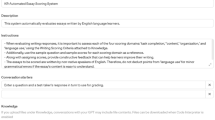
Exploratory study on the potential of ChatGPT as a rater of second language writing
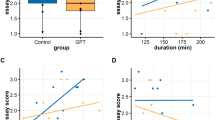
ChatGPT-3.5 as writing assistance in students’ essays
Data availability.
The datasets used and/or analysed during the current study are available from the corresponding author on reasonable request.
Almusharraf, N., & Alotaibi, H. (2023). An error-analysis study from an EFL writing context: Human and automated essay scoring approaches. Technology Knowledge and Learning, 28 (3), 1015–1031.
Article Google Scholar
An, X., Chai, C. S., Li, Y., Zhou, Y., & Yang, B. (2023). Modeling students’ perceptions of artificial intelligence assisted language learning. Computer Assisted Language Learning . https://doi.org/10.1080/09588221.2023.2246519 . Advance online publication.
Athanassopoulos, S., Manoli, P., Gouvi, M., Lavidas, K., & Komis, V. (2023). The use of ChatGPT as a learning tool to improve foreign language writing in a multilingual and multicultural classroom. Advances in Mobile Learning Educational Research, 3 (2), 818–824.
Barrot, J. S. (2023). Using ChatGPT for second language writing: Pitfalls and potentials. Assessing Writing, 57 , 100745.
Barrot, J. S. (2024a). Trends in automated writing evaluation systems research for teaching, learning, and assessment: A bibliometric analysis. Education and Information Technologies, 29 (6), 7155–7179.
Barrot, J. S. (2024b). ChatGPT as a language learning tool: An emerging technology report. Technology, Knowledge and Learning, 29 , 1151–1156.
Beseiso, M., Alzubi, O. A., & Rashaideh, H. (2021). A novel automated essay scoring approach for reliable higher educational assessments. Journal of Computing in Higher Education, 33 , 727–746.
Dergaa, I., Chamari, K., Zmijewski, P., & Saad, H. B. (2023). From human writing to artificial intelligence generated text: Examining the prospects and potential threats of ChatGPT in academic writing. Biology of Sport, 40 (2), 615–622.
Dikli, S., & Bleyle, S. (2014). Automated essay scoring feedback for second language writers: How does it compare to instructor feedback? Assessing Writing, 22 , 1–17.
Gonzalez Torres, A. P., & Sawhney, N. (2023). Role of regulatory sandboxes and MLOps for AI-enabled public sector services. The Review of Socionetwork Strategies, 17 , 297–318.
Guo, K., & Wang, D. (2024). To resist it or to embrace it? Examining ChatGPT’s potential to support teacher feedback in EFL writing. Education and Information Technologies, 29 , 8435–8463.
Han, T., & Sari, E. (2024). An investigation on the use of automated feedback in Turkish EFL students’ writing classes. Computer Assisted Language Learning, 37 (4), 961–985.
Higgins, D., & Heilman, M. (2014). Managing what we can measure: Quantifying the susceptibility of automated scoring systems to gaming behavior. Educational Measurement: Issues and Practice, 33 (3), 36–46.
Hussein, M. A., Hassan, H., & Nassef, M. (2019). Automated language essay scoring systems: A literature review. PeerJ Computer Science, 5 , e208.
Ishikawa, S. (2013). The ICNALE and sophisticated contrastive interlanguage analysis of Asian learners of English. Learner Corpus Studies in Asia and the World, 1 , 91–118.
Google Scholar
Javier, D. R. C., & Moorhouse, B. L. (2023). Developing secondary school English language learners’ productive and critical use of ChatGPT. TESOL Journal, (e755), 1–9.
Lee, A. V. Y., Luco, A. C., & Tan, S. C. (2023). A human-centric automated essay scoring and feedback system for the development of ethical reasoning. Educational Technology & Society, 26 (1), 147–159.
Liljequist, D., Elfving, B., & Skavberg Roaldsen, K. (2019). Intraclass correlation–A discussion and demonstration of basic features. PloS One, 14 (7), e0219854.
Marzuki, Widiati, U., Rusdin, D., Darwin, & Indrawati, I. (2023). The impact of AI writing tools on the content and organization of students’ writing: EFL teachers’ perspective. Cogent Education , 10 (2), 2236469.
Mizumoto, A., & Eguchi, M. (2023). Exploring the potential of using an AI language model for automated essay scoring. Research Methods in Applied Linguistics, 2 (2), 100050.
OpenAI (2023). ChatGPT: Optimizing language models for dialogue . Retrieved October 10, 2023, from https://openai.com/blog/chatgpt/
Ouyang, F., Zheng, L., & Jiao, P. (2022). Artificial intelligence in online higher education: A systematic review of empirical research from 2011 to 2020. Education and Information Technologies, 27 (6), 7893–7925.
Parker, J. L., Becker, K., & Carroca, C. (2023). ChatGPT for automated writing evaluation in scholarly writing instruction. Journal of Nursing Education, 62 (12), 721–727.
Powers, D. E., Escoffery, D. S., & Duchnowski, M. P. (2015). Validating automated essay scoring: A (modest) refinement of the gold standard. Applied Measurement in Education, 28 (2), 130–142.
Ramesh, D., & Sanampudi, S. K. (2022). An automated essay scoring systems: A systematic literature review. Artificial Intelligence Review, 55 (3), 2495–2527.
Ramineni, C. (2013). Validating automated essay scoring for online writing placement. Assessing Writing, 18 (1), 40–61.
Ramineni, C., & Williamson, D. M. (2013). Automated essay scoring: Psychometric guidelines and practices. Assessing Writing, 18 (1), 25–39.
Ray, P. P. (2023). ChatGPT: A comprehensive review on background, applications, key challenges, bias, ethics, limitations and future scope. Internet of Things and Cyber-Physical Systems, 3 , 121–154.
Schade, M. (2023). How ChatGPT and our language models are developed . Retrieved October 28, 2023, from https://help.openai.com/en/articles/7842364-how-chatgpt-and-our-language-models-are-developed
Schmidt-Fajlik, R. (2023). ChatGPT as a grammar checker for Japanese English language learners: A comparison with Grammarly and ProWritingAid. AsiaCALL Online Journal, 14 (1), 105–119.
Schober, P., Boer, C., & Schwarte, L. A. (2018). Correlation coefficients: Appropriate use and interpretation. Anesthesia & Analgesia, 126 (5), 1763–1768.
Shermis, M. D. (2014). State-of-the-art automated essay scoring: Competition, results, and future directions from a United States demonstration. Assessing Writing, 20 , 53–76.
Shermis, M. D., Koch, C. M., Page, E. B., Keith, T. Z., & Harrington, S. (2002). Trait ratings for automated essay grading. Educational and Psychological Measurement, 62 (1), 5–18.
Article MathSciNet Google Scholar
Su, Y., Lin, Y., & Lai, C. (2023). Collaborating with ChatGPT in argumentative writing classrooms. Assessing Writing, 57 , 100752.
Suppadungsuk, S., Thongprayoon, C., Miao, J., Krisanapan, P., Qureshi, F., Kashani, K., & Cheungpasitporn, W. (2023). Exploring the potential of chatbots in critical care nephrology. Medicines, 10 (10), 58.
Vo, Y., Rickels, H., Welch, C., & Dunbar, S. (2023). Human scoring versus automated scoring for English learners in a statewide evidence-based writing assessment. Assessing Writing, 56 , 100719.
Wang, J., & Brown, M. S. (2008). Automated essay scoring versus human scoring: A correlational study. Contemporary Issues in Technology and Teacher Education, 8 (4), 310–325.
Weigle, S. C. (2013). English language learners and automated scoring of essays: Critical considerations. Assessing Writing, 18 (1), 85–99.
Wilson, J., Chen, D., Sandbank, M. P., & Hebert, M. (2019). Generalizability of automated scores of writing quality in grades 3–5. Journal of Educational Psychology, 111 (4), 619–640. https://doi.org/10.1037/edu0000311
Yancey, K. P., Laflair, G., Verardi, A., & Burstein, J. (2023). Rating short L2 essays on the CEFR scale with GPT-4. In E. Kochmar, J. Burstein, A. Horbach, R. Laarmann-Quante, N. Madnani, A. Tack, V. Yaneva, Z. Yuan, & T. Zesch (Eds.), Proceedings of the 18th Workshop on Innovative Use of NLP for Building Educational Applications (pp. 576–584). Retrieved November 19, 2023, from https://aclanthology.org/2023.bea-1.49
Zawacki-Richter, O., Marín, V. I., Bond, M., & Gouverneur, F. (2019). Systematic review of research on artificial intelligence applications in higher education–where are the educators? International Journal of Educational Technology in Higher Education, 16 (1), 1–27.
Download references
This research is funded by the University of Economics Ho Chi Minh City, Vietnam.
Author information
Authors and affiliations.
School of Foreign Languages, University of Economics Ho Chi Minh City, Ho Chi Minh, Vietnam
Ngoc My Bui & Jessie S. Barrot
College of Education, Arts and Sciences, National University, Manila, Philippines
Jessie S. Barrot
You can also search for this author in PubMed Google Scholar
Corresponding author
Correspondence to Jessie S. Barrot .
Ethics declarations
Ethics approval.
The study has undergone appropriate ethics protocol.
Consent to participate
Informed consent was sought from the participants.
Consent for publication
Authors consented the publication. Participants consented to publication as long as confidentiality is observed.
Competing interests
Additional information, publisher’s note.
Springer Nature remains neutral with regard to jurisdictional claims in published maps and institutional affiliations.
Rights and permissions
Springer Nature or its licensor (e.g. a society or other partner) holds exclusive rights to this article under a publishing agreement with the author(s) or other rightsholder(s); author self-archiving of the accepted manuscript version of this article is solely governed by the terms of such publishing agreement and applicable law.
Reprints and permissions
About this article
Bui, N.M., Barrot, J.S. ChatGPT as an automated essay scoring tool in the writing classrooms: how it compares with human scoring. Educ Inf Technol (2024). https://doi.org/10.1007/s10639-024-12891-w
Download citation
Received : 10 January 2024
Accepted : 28 June 2024
Published : 13 July 2024
DOI : https://doi.org/10.1007/s10639-024-12891-w
Share this article
Anyone you share the following link with will be able to read this content:
Sorry, a shareable link is not currently available for this article.
Provided by the Springer Nature SharedIt content-sharing initiative
- Generative AI
- Automated essay scoring
- Automated writing evaluation
- Argumentative essays
- Find a journal
- Publish with us
- Track your research
Test Resources
TOEFL® Resources by Michael Goodine
Toefl writing test evaluation and scoring service, writing should be the easiest part of the toefl. ® .
Many students take the TOEFL again and again to get the writing score they need. This makes me sad because writing should be the easiest part of the test. Students just need proper feedback and guidance to overcome this problem.
Don’t Worry. I Can Help You.
Sign up for my TOEFL Writing evaluation service for:
- Line-by-line corrections of your practice responses.
- A ccurate score estimates.
- Personalized advice on how to get a higher score .
- Complete templates for both tasks.
- Feedback within 48 hours .
- No expiration dates – send your responses any time.
- Submit both integrated essays and “writing for an academic discussion” responses .
Click the “learn more” links below for more information or scroll down a bit to read about my qualifications. Note that I also offer speaking evaluations and proofreading services for university applications.
“Thanks for your for your amazing feedback, Michael! I’m happy to let you know that I scored 113 (28 in writing). Yes, I got the required scores for a pharmacy license!”
– M.S.
One TOEFL Writing Test
Get Started!
- Writing Score Estimate
- Line-by-Line Corrections
- Personal Advice
- Feedback in 48 Hours
Two TOEFL Writing Tests
$20 per test!
Six TOEFL Writing Tests
$18 per test!
12 TOEFL Writing Tests
$17 per test!
Twenty TOEFL Writing Tests
$16 per test! Wow!
Personal Lesson & Consultation
Meet the Teacher!
- 2 Test Evaluations
- Corrections & Score
- 60 minute Zoom Session
- Ask me Anything!
TOEFL Speaking Evaluations
- A Human Score
- A SpeechRater Score
- Detailed Advice
Who Will Check Your Work?
Me! My name is Michael Goodine , and I am the founder of TOEFL Resources. I personally check every essay. Here’s some information about me:
- I’ve been helping students prepare for the TOEFL for about a decade, and in that time I have read more than twenty-five thousand TOEFL essays from students. I know what works, and I know what doesn’t work. My students have entered Ivy League business schools, have qualified for pharmacy and dental licenses, and have gained admission to undergraduate programs all over the world. I work with all kinds of people!
- I hold a degree in English Literature from beautiful Dalhousie University in Nova Scotia, Canada.
- I have received TOEFL teacher training from ETS , the creators of the TOEFL. I update this training every year. You can see my ETS certificates from April 2019 , December 2019 , November 2020 , January 2021 , and June 2022 .
- I’ve also given presentations on behalf of ETS, the creator of the TOEFL test. Check out a promotional image for one of them.
- I am obsessed with TOEFL writing, and have written several articles about how the test is scored. Check out my detailed study of the e-rater software and an update from 2020 .
- I worked as a researcher and textbook writer (TOEFL & TOEIC) for Hackers Education Group , one of the largest publishers of TOEFL books in Asia.
- My YouTube Channel, Test Resources , has more than 95,000 subscribers.
I like to think I’m an expert when it comes to the TOEFL writing section. I want to use that expertise to help you reach your goals.
What are People Saying about the Service?
I would like to share my happiness with you as I finally passed the TOEFL exam with a total score of 94 and you were helpful in an amazing way. I appreciate your comments which have transformed my writing to achieve 22 . Thank you so much , I will definitely recommend you to my friends. -B.M
I just received my scores (28/29/29/29). Thank you so much for you help! Your tips gave me enough confidence to push through this difficult test! -F.B
Thank you for your help. I finally got 26 in writing with an overall score of 107. Your help was great. -S.K, Dentist
I just want to share some good news with you, I got R29 / L26 / S23 / W25 on my last TOEFL test, and that’s enough for me. Many thanks for your help! You really offer effective training. An expert like you will never be replaced by AI models! -G.S, China
I just saw my TOEFL result. I PASSED!!!!!!, Reading 23; Listening 27; Speaking 27 ; Writing 24. Thank you so much for the tutorials, free vouchers, links and encouragement. -T.P, Pharmacist
Today, I received my TOEFL score! R:30 L:28 S:23 W:28 Overall:109 Thanks to your evaluations and advice, I have achieved my goal in TOEFL!!! Your advice was always very strict but helpful and I really appreciate you. My writing score was 17 in my first TOEFL, but I made a lot of progress in 10 months!! Mike, thank you so much!!! -T.A, Japan
( more testimonials )
(It’s me!)
Note that TOEFL is a registered trademark of ETS. This service is not endorsed or approved by ETS .

IMAGES
VIDEO
COMMENTS
The TOEFL iBT test Writing section measures your ability to write in English in an academic setting, and to present your ideas in a clear, well-organized way. There are two writing tasks. Integrated writing task (20 minutes) — read a short passage and listen to a short lecture, then write in response to what you read and listened to.
Integrated Writing Rubric. A response at this level successfully selects the important information from the lecture and coherently and accurately presents this information in relation to the relevant information presented in the reading. The response is well organized, and occasional language errors that are present do not result in inaccurate ...
The writing section is the final part of the TOEFL® test. You'll have about 30 minutes to answer two writing questions. They are known as the TOEFL Integrated essay, and the TOEFL Writing for an Academic Discussion Task. You'll be graded based on your content, organization, grammar and language use. Below are links to my best stuff, or ...
Below is an official TOEFL Integrated Writing sample question and as well as an essay response that received a score of 5. It includes a written passage, the transcript of a conversation (which would be an audio recording on the actual TOEFL, and the essay prompt. After the prompt is an example of a top-scoring essay.
About these TOEFL ® Writing Samples TOEFL Integrated Writing Practice. The first TOEFL writing question is the Integrated Writing Task. You will first read an article, then listen to a lecture, and finally write an essay using details from both. Your essay should be about 280 words. You will have 20 minutes to write.
Here's how the TOEFL Integrated Essay works: It is the first writing task on the TOEFL test. First, you will have three minutes to read an article (four paragraphs, 250 to 300 words) about an academic topic. Next, you will listen to a lecture (about 2 minutes) about the same topic. Finally, you will have 20 minutes to write an essay about the ...
After you complete the exam, your essays will be graded by several (typically four) graders. Each essay will receive a score from 0-5. The sum of those two scores will then be scaled to a score from 0-30, which is your official Writing score. The Writing section makes of 25% of your total TOEFL score (from 0-120).
A well-organized essay is the backbone of a high-scoring TOEFL Writing response. To begin, your essay should have a clear introduction that introduces the topic and presents a strong thesis statement. ... (Rubrics) for TOEFL iBT Speaking Responses (PDF) Criteria to evaluate speaking responses. Scoring Guides (Rubrics) for TOEFL iBT Writing ...
The primary criteria used by graders to evaluate essays are development, organization, and language use. TOEFL iBT Integrated Writing ... The suggested length of the essay is 150-225 words. TOEFL iBT Independent Writing On the iBT independent writing task, students write an essay in response to a prompt that can deal with a wide variety of ...
The essay is evaluated based on criteria such as development, organization, language use, mechanics, and overall writing quality. ... This article aims to provide a comprehensive guide on achieving the best TOEFL score for the Independent Writing Essay. The TOEFL is a widely accepted English language proficiency exam used by academic and ...
Your essays will be graded by numerous (usually four) raters after you finish the exam. Each essay will be graded on a scale of 0 to 5. The total of these two scores will be scaled to a score between 0 and 30, which will be your official TOEFL Writing score. The TOEFL Writing section accounts for 25% of your total score (from 0-120). The TOEFL Writing section assesses your ability to write a ...
Marking Criteria for TOEFL Writing Score. The TOEFL writing section is scored on a scale of 0-30. Your writing is scored based on two tasks, and each task is scored on a scale of 0-5 by two independent readers. ... Not an essay, just a copied sentence from the passage with severe grammatical mistakes. Understanding the TOEFL writing score ...
Here's an expert TOEFL teacher's sample essay to this particular TOEFL Writing topic. The article introduces the topic of corn-based ethanol. More specifically, the writer discusses the advantages of switching from fossil fuels to this alternative energy source. The lecturer in the listening passage disagrees.
You might also define good as being in the top quarter of test-takers, or at least the 75th percentile. That would require a Writing score of at least 25. An excellent Writing score in the 90th percentile would mean you scored higher than 90% of other test-takers on that section. This requires a score of at least a 27.
The TOEFL integrated writing task is the first of the two writing tasks in the TOEFL exam. It's designed to assess your ability to combine listening and reading skills to write a coherent and well-structured essay. Here's a detailed breakdown: Reading passage: A passage around 200-250 words long is provided.
TOEFL essay templates can help you answer both of the TOEFL writing questions. To write a strong TOEFL essay just fill in the blanks with the required information from your notes (in the integrated essay) or from your ideas (the writing for an academic discussion task). Note that I also have a set of TOEFL speaking templates.
Like the other sections of the TOEFL, the Writing Section, it is worth 30 points (out of 120), or 25%, of your overall TOEFL score. Two to four ETS graders will mark your writing from 0-4, which is then converted to the 30-point scale. In order to receive a top score, your essays must not only have few spelling and grammar mistakes, but also be ...
Find out the marking criteria of the TOEFL writing section and how the TOEFL writing score is calculated. Prepare well to secure a good TOEFL writing score. Select Country. ... TOEFL essays will be graded on a scale from 0-5. The TOEFL writing score can be aced with practice. TOEFL total score ranges in a scale of 0 to 30 level.
in. TOEFL Writing Task 1 (Integrated) For many students taking the TOEFL, scoring a 5 out of 5 on each of the two TOEFL essays—which would lead to a perfect score of 30 in the writing section—is the ultimate goal. Getting there takes a lot of practice, but it pays off nicely! Scoring so high in one section can counterbalance slightly lower ...
Responses in the writing section will each be given an overall score from 0 to 5. For question 2, the writing for an academic discussion task, the raters are looking for three main things-- relevant and clearly developed ideas, variety in the use of language, and a correct use of language. First, relevant and clearly developed ideas.
TOEFL Independent Writing Master Guide (2023 Update) Here's how the TOEFL Independent writing question works: It is the second writing question on the TOEFL Test. You will be asked a question about your personal opinion and be given 30 minutes to write about it. Questions can be about any topics, but they are most often about education, work ...
The TOEFL (Test of English as a Foreign Language) is a highly recognized English language certification test for non-native speakers. Over 11,000 educational institutions and agencies accept it in more than 150 countries. The TOEFL is commonly required as part of college application and admission criteria.
The TOEFL scoring system includes several features that are important for test-takers to know. Read on for a discussion of scoring features, scoring rubrics, and evaluation criteria. ... If a test-taker receives an integrated essay score of 4, he or she is "generally good" at meeting the above criteria, but the essay may have "minor omissions ...
With the generative artificial intelligence (AI) tool's remarkable capabilities in understanding and generating meaningful content, intriguing questions have been raised about its potential as an automated essay scoring (AES) system. One such tool is ChatGPT, which is capable of scoring any written work based on predefined criteria. However, limited information is available about the ...
Don't Worry. I Can Help You. Sign up for my TOEFL Writing evaluation service for: Line-by-line corrections of your practice responses. Accurate score estimates. Personalized advice on how to get a higher score. Complete templates for both tasks. Feedback within 48 hours. No expiration dates - send your responses any time.